Business Cares: Diversity in Business








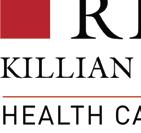




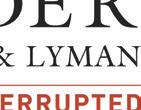






























Markets
Together,


Bob Drida Financial Advisor
First Vice President–Wealth Management
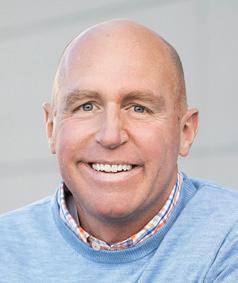

Brad Simenz Financial Advisor Senior Vice President–Wealth Management
Greg Pfaff Financial Advisor First Vice President–Wealth Management



By Hunter Turpin, staff writer
A proposal to convert downtown Milwaukee’s 100 East office tower into apartments could receive $14.4 million in tax incremental financing (TIF) from the city, under a plan released earlier this month.
The 35-story building, located at 100 E. Wisconsin Ave., has been steadily vacating since 2020 as office tenants have found
BY THE NUMBERS
space in newer office buildings. After falling into foreclosure, the building was acquired in 2023 by a development team led by Milwaukee-based Klein Development and restaurateur John Vassallo, who have planned to transform the property into a residential building.
The redevelopment is expected to cost $165 million and will



include 373 apartments. Of those, 75 units will be designated as “workforce housing” for tenants earning up to 100% of Milwaukee’s area median income (AMI).
Milwaukee’s Department of City Development (DCD) is proposing a new TIF district to support the project with $14.4 million in TIF.
Additional financing for the 100 East project could come from state and federal historic tax credits.
Vassallo has said construction work could begin this year.
The city’s TIF support is one of the first projects proposed under DCD’s updated TIF guidelines, which were unveiled in April.
That new plan expanded eligibility for TIF to include conversions of obsolete commercial buildings into housing and projects that include workforce housing units, which are units set aside for renters making between 60% and 100% of the AMI.
For reference, 100% AMI in Milwaukee County equals $77,500 for an individual or $110,700 for a family of four, according to federal data. Previously, the city only considered TIF for housing projects that included units for those earning less than 60% of the AMI, which is generally referred to as affordable housing and usually subsidized by the state or federal government.
“This investment demonstrates that the City of Milwaukee is ahead of the curve nationally when it comes to recognizing the need
to get creative and find a solution to repurpose obsolete buildings,” Vassallo said in the release. “Transforming this building into housing reflects a broader vision of how cities can grow thoughtfully. This development would not be possible without the city’s leadership and commitment to the future of downtown Milwaukee.”
More broadly, however, the updated guidelines have not been well received by developers, many of whom say—among other critiques—the city should codify the guidelines as policy to give developers more certainty that their projects would be supported.
HOUSING PROJECT
In addition to the 100 East TIF announcement, DCD announced that it will also be supporting an affordable housing project in the city’s Harambee neighborhood with TIF.
Located at 3116 N. Doctor Martin Luther King, Jr. Drive, the project, known as Compass Lofts, will include 67 housing units, 56 of which will be set aside for renters earning below 60% of the AMI. The project team is led by Martin Luther King Economic Development Corp. (MLKEDC) and EA Development.
DCD is proposing a TIF investment of $1.37 million. The total estimated development cost is approximately $19.8 million.

By Sonia Spitz, staff writer




WAUWATOSA-BASED social networking app Sit By Me was created to break the ice between remote workers while increasing revenue for local cafés and co-working spaces.
Founder and CEO Brad Steckart was sitting at a coffee shop writing a paper for graduate school when he looked up and realized three other people were sitting alone, likely doing similar tasks. Four people were occupying four separate tables, leaving nine seats empty but unofficially taken. As the café got busier, Steckart thought there must be a way to optimize café space and create connections between likeminded patrons.
From that experience, Sit By Me, an app that indicates a person’s working status at public venues like cafés and other co-working spaces, was born.
“One in four workers is now remote, and they’re craving more than just productivity –they want people, purpose and places that inspire them,” Steckart said.
Sit By Me uses geographic location services to connect users. Once open, the app displays a map of active users represented by a red or green dot – green indicating “open to chat” and red indicating “working quietly.” Users can down-
load the app for free and upgrade to a premium version with added features for $5 a month.
Steckart, a UW-Stevens Point and UW-Milwaukee alum previously led budget development in the public sector after receiving a master’s degree in public administration. Steckart then transitioned into SaaS (software as a service) work to lead a team at a tech firm that serves state and local governments.
“My focus was helping public sector clients solve complex problems with scalable, user-centered digital solutions,” said Steckart.
“That blend of business strategy and community-minded service is at the core of how I built Sit By Me.”
Sit By Me has partnered with several local businesses including Wantable Cafe and BizStarts Community Market, both in Milwaukee’s Walker’s Point neighborhood, and Haven Cafe in downtown Milwaukee’s Juneau Town neighborhood.
Sit By Me has a presence in Denver, Colorado, and is planning to expand into other peer markets as it gains momentum in Milwaukee. Its next steps include gaining 10,000 users, partnering with 25 businesses and beginning an initial funding round in 2025.

YANCEY STRICKLER
Yancey Strickler, co-founder and former CEO of crowdfunding platform Kickstarter, outlined his career in a keynote speech addressed to more than 550 attendees at the Milwaukee Jewish Federation’s annual Economic Forum. Strickler, who grew up in a town of less than 400 people in southwest Virginia, has played many roles in his life including journalist, music critic, co-founder and author. After leading a multimillion-dollar crowdfunding company for 12 years, he turned his attention to new creative ventures including, currently, Metalabel and Artist Corporations. Strickler, 46, shared lessons learned and his newfound expertise in starting from scratch.
“I’ve come to realize that a lot of the narratives we have about our life are retrospective. I don’t think you live in the shape of a narrative. You just sort of live.”
“Ultimately, starting a business is about, how can you be helpful to other people?”
“If I look back at myself during those initial steps of making Kickstarter, it’s just rampant foolishness. But when you start, it’s so much about what you know and what you don’t know, and then this painful learning of those two things.”

“All of the different struggles I went through were the exact conditions of progress or growth.”
With custom solutions that grow with your business, we have the support you need.
“All the wonder of life is in the open space, which is both what it is and the fact that we can keep rewriting it.”
“You’re going to have those times where you’re in the right pocket, you and the world are moving in synchronicity and it’s all coming so easily. But it won’t always be that way, and who are you then?”




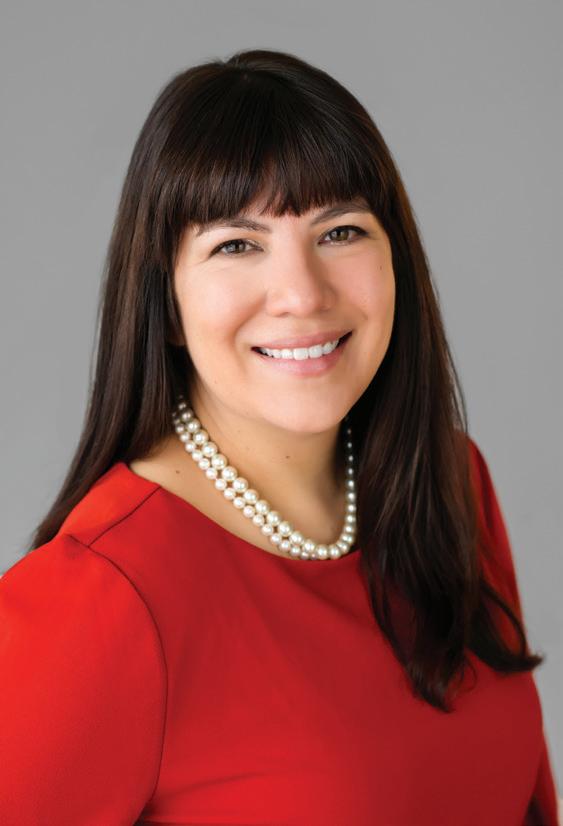



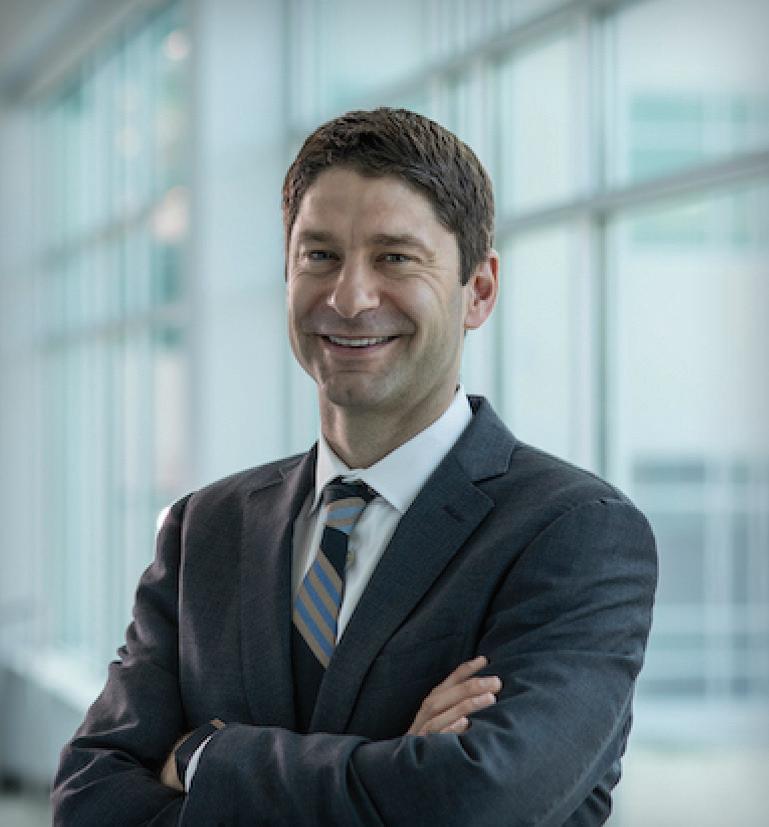

SHAPING YOUR OUTLOOK FOR THE REST OF 2025?
President and co-founder, Craft Beverage Warehouse
“I’ll be watching international economic policy, specifically trade negotiations. Lack of certainty and transparency in trade developments affect our business more than any specific tariffs that are put in place or removed. As large companies hedge prospective trade developments, it moves pricing on commodities that impact our underlying business costs.”
President and CEO, United Way of Greater Milwaukee & Waukesha County
“Our donors trust us to lead solutions to big problems. In 2025, we are transitioning our model to impact based funding. Our goal is to solve important issues faster. Issues like reducing barriers to employment, ending family homelessness, bridging the digital divide, and offering mental wellness support to high school students.”
CEO and board chair, Sellars Absorbent Materials
“We are adding production capacity of our proprietary manufacturing specialty paper technology to support increased demand and future growth. All of the raw materials used in our manufactured products are either made in the U.S. or are presently exempt from tariffs. However, tariffs have had an indirect impact of increasing the costs of our raw materials due to the disruptions, uncertainties, and strong demand for these commodities. Our increased costs are necessitating us to raise prices, which could impact demand.”


President and CEO, Husco
“Uncertainty is top of mind for a company like ours with an international supply chain and facilities. It’s hard to play a game when you don’t know the rules. With trade and tax policy, geopolitical risk and global economic conditions all becoming more difficult to predict, it represents a significant challenge for us and our customers.”
Board chair, Greater Milwaukee Association of Realtors Vice president of leadership and sales, First Weber
“It will continue to be a seller’s market. We do not have enough inventory in most price points, but especially for first-time buyers. The market could absorb about 5,000 more homes for sale. The result is prices are going up, but maybe not as fast as in recent years.”
The latest area economic data.
For the first 5 months of the year, passenger traffic at Milwaukee Mitchell International Airport was down 8.9% to 2,361,301.
Wisconsin’s GDP declined 0.6% during the first quarter of the year.
The number of homes sold in the four-county metro Milwaukee area in June increased by 13.7% compared to a year ago.




Wisconsin’s unemployment rate is at 3.3%

The state’s tourism industry had a $25.8 billion economic impact in 2024, up 3.3% from 2023.




Business analyst, CTaccess 275 Regency Court, Brookfield








ctaccess.com | Industry: IT services and consulting




• Tom Wielenbeck is excited by how quickly IT tools are evolving. “In my training sessions, I often take a real issue a team is facing and build a working solution – sometimes two or three – in a single two-hour meeting. It’s incredibly rewarding.”
• The most challenging part of his current role is the breadth of his responsibilities. He handles the full software development lifecycle, sales, training and support. “I enjoy being the connective tissue across those functions; it gives me a deep understanding of the full impact of our solutions.”
• He’s recently noticed a shift in local businesses preferring to own their IT tools rather than using a subscription model. “Cloudbased and hosted environments are becoming the go-to as businesses recognize long-term savings and flexibility.”
• In his spare time, Wielenbeck enjoys camping, traveling, gaming with friends and cooking.
• He describes himself as a dedicated, improvement-driven worker. “I prioritize deep focus time for complex tasks like development and continuously audit my processes to operate more efficiently.”
• He roasts his own coffee and enjoys making sweet espresso drinks. “When I don’t have energy to make all that though, I will just drink the espresso straight.”




































































































































Education:
Bachelor’s, Marquette University


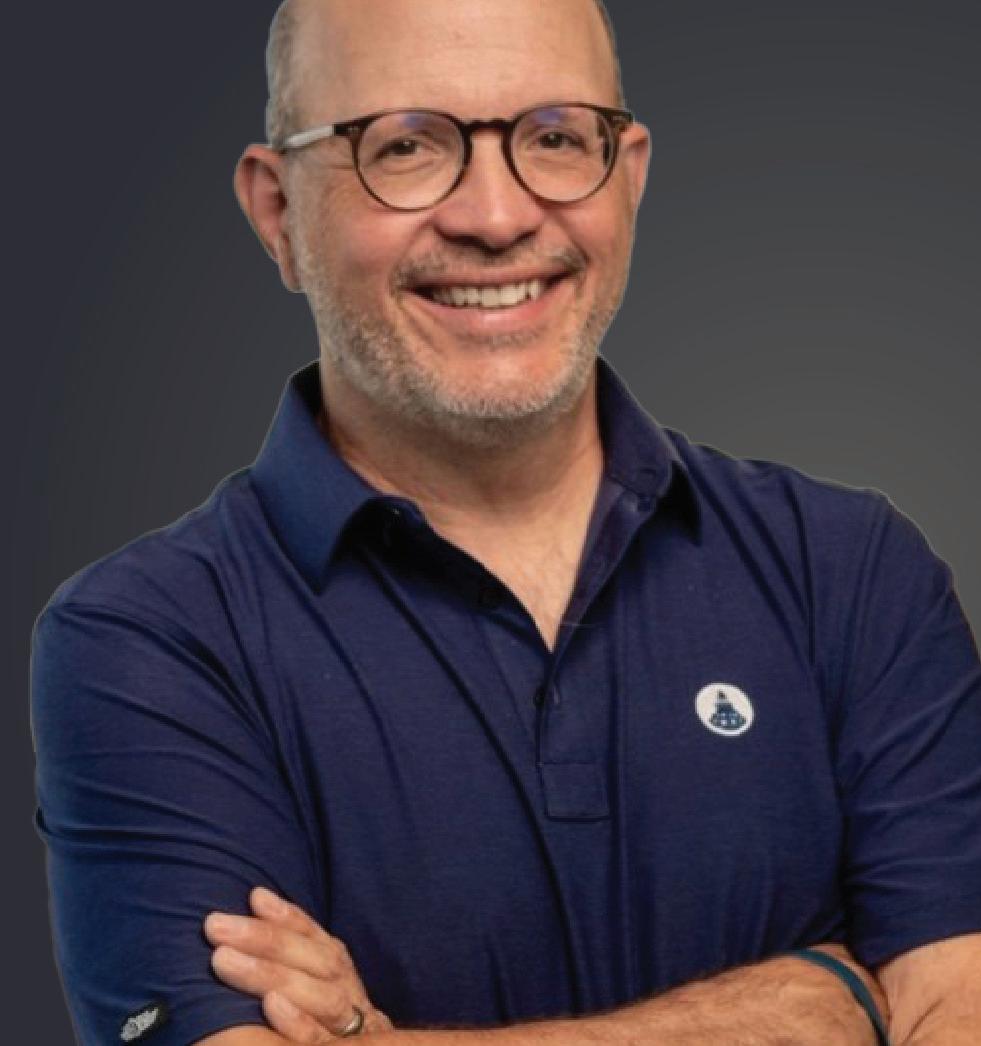
This Q&A is an extended profile from the 2024 edition of Wisconsin 275, a special publication from BizTimes Media highlighting the most influential business leaders in the state. Visit: biztimes.com/wisconsin275 for more.
How do you see the future of your industry?
“7Rivers envisions a future where artificial intelligence and data-driven solutions play a transformative role across industries. Our company is focused on becoming the choice of Fortune 1000 companies, leveraging AI to deliver innovative solutions.”
If you could choose any other career path, what would you want to do?
“No way! I already had that conversation with myself over a dozen years ago and it led me to launch companies like the one I’m driving now: leveraging technology on the edge to drive incredible business value for our customers.”
Do you have a secret talent?
“I would call this more of a superpower: intuitive aptitude. Being able to quickly understand a company’s challenges and opportunities at a level to stand alongside them and create solutions that elevate their business.”
If you could time travel for one day, when and where would you go?
“I have had the opportunity to go to some pretty remarkable places. People that know me well will understand why I named my companies 7Summits and 7Rivers. I love the outdoors. I love the adventure. So, it’s no surprise that I would have loved to have been on a major expedition alongside Roald Amundsen when he drew the first line through the Northwest Passage or made it successfully to the South Pole before anyone else. Those types of


Founder and CEO
7Rivers Inc.

MILWAUKEE

Paul Stillmank is a veteran technology executive and entrepreneur. He is the founder and chief executive officer of 7Rivers Inc., a consulting services firm focused on artificial intelligence and data modernization. The startup raised an initial $4 million seed round in 2023 and an additional $2 million in 2024 to support its expansion. Previously, he founded and grew 7Summits, a Salesforce consultancy, to 200 employees and five appearances on the Inc. 5000 list before selling it to IBM in 2021.
experiences represent what I believe we’re doing in the companies that I’ve created. We are walking a path so that others may follow with the confidence that what some thought was impossible can be achieved, and that the way is safer and clearer by those who helped forge that path.”
What advice would you give to someone going into a leadership position for the first time?
“Focus on vision and purpose first. I cannot emphasize enough the importance of having a clear vision that aligns with the broader mission of the organization. I built 7Summits around a vision of community-driven digital transformation, and now, with 7Rivers, we are leading by staying focused on modernizing businesses through AI and data to drive measurable business value. As a new leader, it’s crucial to inspire and guide your teams with a purpose that aligns with both their individual goals and the company’s goals.”
What is your favorite Wisconsin destination?
“That’s an easy one for me — just picture me sitting in a 1923 cedar and canvas Old Town canoe floating down the beautiful Bois Brule River, fly rod in hand. That river flows through Northwest Wisconsin in Douglas County near the town of Brule, Wisconsin.”
What is your cocktail of choice?
A Sazerac: Rye Whiskey, absinthe, sugar, bitters, lemon or orange.”
Is there anything new that you would like to learn this year?
“Artificial intelligence represents the dawn of a new age.
I deeply believe that and want to continue to learn how AI advancements continue to evolve and help businesses reach new heights.”
What is your definition of success?
“For me, success is building a company that not only grows rapidly but also delivers long-term value and innovationnot just to the companies that we serve, but to the world. Success is unleashing people’s potential and elevating them.”
What are the most important traits to look for when hiring a new employee?
“Curiosity and continuous learning – a desire to stay curious and continually learn, especially in fast-evolving fields like AI and technology. Collaboration and teamwork – the ability to collaborate on a team, contributing to a culture of innovation and collective success. Purpose-driven mindset – a focus on aligning personal work with the broader mission and purpose of the company.”
What’s your favorite movie and why?
“‘A River Runs Through It.’ For those who know me well the ‘why’ is obvious. The fly fishing? Yes. But also, the deep passion to become an expert at something so closely related to the natural world.”
If you could be an Olympian in any sport, what sport would you pick?
“The decathlon. For me, that represents the range of excellence at multiple skills that it takes to be a great athlete, but I related back to building a great company. You need to do so much more than have a great idea.”
BIZTIMES MILWAUKEE: AI continues to have a massive impact on industries across the world. How does Annex see AI as a disruptor in financial services?
SPANO: “The growth and use of AI is causing huge debate throughout the industry and our entire culture. While some in the financial services industry are just now awakening to its potential (and potential danger), we’ve already begun finding collaborative, secure paths to use AI as a supplement to our team. AI isn’t ready, and may never be, to completely listen or interact at a level comparable to our wealth managers. However, it can help perfect our workflows and safeguard our daily work against human error.”
BIZTIMES MILWAUKEE: What do you see as your most important responsibility to your employees?
SPANO: “Our most important responsibility to the Annex team is making sure we’ll be there for them and that we meet our vision together. Annex provides the infrastructure for employees to grow with the firm. In the end, it’s about shared commitment and empowerment. Our best days lie in front of us, and the path forward demands true teamwork, commitment to each other, and support of our shared vision.”
BIZTIMES MILWAUKEE: What do you see as your most important responsibility to your clients?
SPANO: “Our most important responsibilities to clients are two-fold: listening to help them through their financial journey, and aiming to reduce friction (taxes, costs) as a fiduciary while improving outcomes. Personalized planning starts with a deep understanding of the values and objectives of the person we’re planning for, and that starts with listening. Ultimately, our clients tend to experience the best chance for satisfaction when their plan reflects their thoughts, concerns, and goals.”
BIZTIMES MILWAUKEE: Of all the sweeping headlines we’ve experienced this past year, which do you think may have been most overlooked?
SPANO: “In May of 2025, streaming surpassed both broadcast and cable TV in total viewing time in the US. Most people would find that news anticlimactic, since we’ve all noticed the trend. For us at Annex, it’s the culmination of a movement we’ve seen in our clients and potential clients over the past year, an increased reliance on the internet as a source of news, communication, and entertainment across every age group. Every area within Annex Wealth Management, from marketing to reporting and how our clients expect updates, is affected by this change.”
BIZTIMES MILWAUKEE: How does your company foster innovation?

continuous learning and improvement; and we’re steadily seeking clientcentric solutions that address unique client needs and challenges.”

SPANO: “We’ve always done a good job of providing opportunities for every member of our team to collaboratively share innovative ideas and philosophies, and it’s an area we’re focused on even more lately. We continue to embrace and integrate technology into our workflows to improve our level of service and team efficiency; we’re consistently encouraging 17950 W.








THEODORE “TJ” PERLICK MOLINARI has taken the helm as chief executive officer of Milwaukee-based Perlick Corp. during a crucial era of innovation for the bar and beverage equipment manufacturer. He officially became CEO on July 1, representing the company’s fifth generation of family leadership. In his new role, Perlick Molinari will guide Perlick’s long-term vision and strategy. While Perlick is renewing its commitment to making high-quality bar, beverage and refrigeration systems, the manufacturer is also ushering in a period of innovation and modernization, which is reflected by a recently announced company rebrand. Perlick Molinari recently sat down with BizTimes Milwaukee reporter Ashley Smart to discuss the importance of honoring the company’s 107-year-old legacy while modernizing to meet customer demands.
BizTimes: What preparations were taken ahead of you assuming the role of CEO?
Perlick Molinari: “The most important thing to me was having the confidence of all the people in the organization and my family. Without their support, the business isn’t successful. We went on a journey as a family to try to understand what it would take to get that support and if that support existed. Our family is not into putting people in positions just because they’re family members. It’s because it’s the right thing to do for the business, and that’s an approach that we’ve held to for the last 12 years. What’s more important than family support is the support of the organization. We began getting feedback from key people in the organization, asking what they expect to see out of the next leader. We were able to undergo that process, come together as a family, listen and discern, and we aligned around a model of the way that we would like to run the business.”
Theodore
“TJ” Perlick Molinari
CEO Perlick Corp.
8300 W. Good Hope Road, Milwaukee Employees: 250 in Milwaukee, 325 total perlick.com
What does that model look like?
“The CEO is a visionary role. Then you need an integrator, a very hands-on tactical execution person, and then you have the functional leaders who report to that tactical person. A strategy is developed by the CEO and the president, and then it’s executed by the president. My job is to go out and look at what’s coming … to be a voice for the family, from a cultural standpoint, as to what we want to see. That’s what I’m supposed to focus on in my role. And I feel very comfortable doing that.”
What was some of the key feedback you received from company stakeholders?
“They were trying to understand our north star as a company. One key component of that is what we describe as a legacy component. The legacy component includes (the company’s) multigenerational relationships. When we were assessing what we needed in our next leader, what emerged as something that was important to our customers was having a multi-generational touch point, consistency and continuity, so that our customers can expect where we’re going.”
Has anyone in the sixth generation expressed interest in joining the company?
“Our oldest in that generation is 17 years old. The youngest is four. There are 11 kids (total) right now. My cousin Lori is our shareholder director, and she’s in charge of shepherding those kids through the learning process. We don’t have a hard and fast rule yet that you need to go out and seek outside experience. It just so happened to turn out that way for everybody here. I spent 10 years as an attorney outside of Perlick. That is something I would want all of those kids to do. Lori has developed a curriculum where at a certain age, you’re exposed to different aspects of the business – what it is, how it runs – when they’re ready for it.”
What was the purpose of Perlick’s brand refresh announced in February?
“We had come through a challenging chapter in the company’s history, and we needed an opportunity to be a new Perlick. Old companies can become museum pieces. We’re really looking to the future and to innovation. We’ve always been the industry leader, from a standpoint of product, from service, from knowledge, we are the iconic brand. You don’t get that by continuing to rest on what you’ve done in the past. You have to continue to innovate. At our latest trade show, not only did we unveil eight new products, but also eight new technologies at the same time. This team pulled off that almost impossible task with flying colors. We have now become more relevant to our customers and more relevant to the people who work here.”
What are some of Perlick’s newest innovations?
“We’re currently testing geo tracking. In our industry, it’s all about construction schedules and knowledge of where a product is and

what’s in the boxes. Freight companies are notoriously unreliable, so we have nodes in each of the boxes so that we know exactly where those boxes are at all times. They ping the Wi-Fi towers (and provide a location). We are the only ones doing that right now even though that was a huge demand and brought up by the distributors. I was able to say we are the leader. That’s where people expect us to be.”
How often will Perlick launch new products?
“Our goal is one product every quarter. Whether it’s a refresh of a current product or a brand-new product to the market, we want to make sure that as the industry leader, we’re delivering new, innovative products on a regular basis. It’s good for our customers, because usually they’re based on demand from the market.”
How are tariffs and economic uncertainty impacting the business?
“It’s certainly challenging. Domestic suppliers have already taken price increases because they could. That impacts everybody in the next step, which is the manufacturers. We source all of our goods and all those things just got between a 5% and 10% price increase. Our dealer network was hit with between 200 and 300 price increase notices, all effective July 1. Usually, price increases come from different companies at different times of the year, and you can space it out so a dealer can manage it. When everybody comes at the same time, they have to go back and basically refinance the projects. It’s like a 15% increase in cost overall and that’s not something they can eat. People are pumping the brakes as they try to figure out what’s going on with price. It’s causing a lull, which we’re experiencing, and so is everybody else in the industry.”
25_005815_Milwaukee_Biz_Times_JUL_21 Mod: June 12, 2025 10:11 AM Print: 06/16/25 page 1 v2.5































1. Wangard/ Siepmann housing
Costco
Drexel Town Square 4. Derse
5. Buc-ee’s
6. Saputo
7. Modine/ Microbial Discovery Group
8. Krones
9. Yaskawa
10. F Street housing


By Hunter Turpin, staff writer
AT THE
SOUTHERN EDGE
of Milwaukee County, Oak Creek and Franklin are in the middle of a development boom.
A wave of investments – totaling hundreds of millions of dollars – is steadily flowing through the I-94 North-South corridor. These projects are bringing thousands of jobs, hundreds of housing units and new retail options to an area that has historically grown at a slower pace than the more established I-94 East-West corridor through Waukesha County.
In Franklin, Yaskawa America, a Waukegan, Illinois-based manufacturer of motion control and robotics automation systems, plans to
invest $180 million in a new North American headquarters campus. The development will bring 700 new jobs to the city.
Nearby, Saputo, a dairy company based in Canada, continues to expand its footprint. After establishing a 340,000-squarefoot facility in 2021, the company has now opened a second 311,000-square-foot structure adjacent to its current site. The combined investment totals $175 million and will employ around 600 people.
Also, within the past year in Franklin:
» Microbial Discovery Group, a biotech firm based in Oak Creek, opened a 117,000-square-foot facility.
» Modine, based in Racine, is
Map of significant developments in Franklin and Oak Creek
opening a 153,000-squarefoot facility dedicated to its advanced thermal systems group, bringing 200 jobs.
» Krones, a packaging and bottling systems manufacturer, leased a 240,000-squarefoot space near its U.S. headquarters site for a new logistics center.
In Oak Creek, Derse announced plans to build a new 297,000-square-foot facility, moving its headquarters from Milwaukee’s Menomonee Valley. Planned for the southwest corner of West Oakwood Road and South Howell Avenue, the project will be the capstone to the OakView
Business Park.
City officials and industrial real estate experts attribute the growth in both municipalities to the area’s proximity to labor, the freeway and Milwaukee Mitchell International Airport.
“This is just a natural evolution of where Milwaukee County was poised to grow next,” said Andrew Vickers, Oak Creek city administrator. “We’re kind of in the tornado alley of growth.”
Moreover, many of the metro area’s more mature suburban industrial real estate markets have limited land available for new development and the existing stock of buildings are mostly full. For instance, Waukesha County has an industrial space vacancy rate of just 1.3%.
“Try to find 30-plus acres with proximity to labor and a highway. You can’t,” said Jeff Hoffman, principal at Cushman & Wakefield | Boerke. “It’s worth noting, though, that overall the (industrial real estate) market has slowed, and there were quarters last year where even the Franklin-Oak Creek submarket had negative absorption. Still, deals have been getting done and some notable ones at that.”
Both Franklin and Oak Creek have seen more than 20% increases in their populations since 2000, with more housing in the pipeline.
In Oak Creek, Milwaukee-based Barrett Lo Visionary Development is planning an additional 400 apartments at Drexel Town Square in 2026, Milwaukee-based F Street is continuing to expand its Lakeshore Commons housing development and a partnership between Wangard Partners and Siepmann Realty Corp. could bring more than 530 residential units northeast of South 27th Street and West Drexel Avenue.


In Franklin, Mayor John Nelson said the municipality has seen “unprecedented” housing growth in recent years.
Despite this population growth, retail development has been a lagging sector in southern Milwaukee County, according to local retail brokers. But now it’s catching up.
“Milwaukee County and the rest of the metro for the most part are a mature market for most retailers,” said Mike Fitzgerald, principal at Mid-America Real Estate Wisconsin. “Menomonee Falls, Brookfield, Delafield, Grafton, all have reasonable store counts for most of the larger format retailers. Southern Milwaukee County really hasn’t had any ground-up new construction that has occurred over the last decade for those types of retailers, and that’s really where the pent-up demand has started to build.”
That pent-up demand is starting to be released. Buc-ee’s, the Texas-based travel center with a
cult following, has selected Oak Creek for its first Wisconsin location. The 73,000-square-foot store will feature 120 gas pumps and sit near 27th Street and Elm Road. Meanwhile, a Costco store is in early planning stages in Franklin, northwest of Drexel Avenue and 27th Street.
Further, a development connected to Wangard and Siepmann’s housing project in Oak Creek could bring more than 62,000 square feet of retail space and 9.4 acres worth of outlots for development. Known as The Prairie, the project would be one of the few developer-led retail developments in the metro area in several years. Most other retail developments in Oak Creek and elsewhere in recent years have been developed and financed by the end user.
“It will be a good litmus test,” Fitzgerald said. “Seeing if the construction pricing, the rents retailers are willing to pay and the rest of the financials come together.”
Despite the flurry of development, city leaders in both Franklin and Oak Creek say they are being selective with what they approve.
“We say ‘no’ to a lot of projects,” said Vickers. “The ones that materialize are the ones that do fit in our plan and are really quality projects for our community.”
Oak Creek has put limits on certain types of development, including car washes and drivethrus, as well as speculative industrial buildings and distribution centers. Instead, the city is pursuing developments that offer “Oak Creek-sustaining jobs,” Vickers said, pointing to Derse’s new headquarters as an example.
Franklin is taking a similar approach. Nelson said the city is focused on quality commercial development that can broaden the tax base and provide jobs with decent wages.
Both cities are aware that the development boom may only last so long.
“Although we’re announcing a lot of these new greenfield developments and things like that right now, there’s only going to be a 10- or 20-year window where we’re still working on those pieces coming in,” Vickers said.


















It has been a wild year politically in the United States under the second term of President Donald Trump, who has delivered on his promise to shake things up in a big way.
Seeking to drastically reduce the U.S. trade deficit, Trump has instituted tariffs on numerous countries, and later delayed, rescinded or changed many of them. Trump recently announced a 25% tariff on Japan and South Korea to begin Aug. 1. The ever-changing tariff situation has created a tremendous amount of uncertainty, putting some businesses into a holding pattern.
The Trump administration has also undertaken a massive crackdown on illegal immigration. The impact of that on the U.S. economy and the labor market are just beginning to be felt.
Earlier this month, Trump signed into law the “Big Beautiful Bill,” which he pushed and includes major tax breaks and spending cuts, that could provide a major boost to the economy. Democrats have complained the tax cuts are heavily in favor of the wealthiest Americans and that cuts to Medicaid and the Supplemental Nutrition Assistant Program (SNAP) will have a devastating effect on lower-income individuals.
With so many big changes sending shockwaves through the country, the U.S. economy slumped during the first quarter, with U.S. GDP falling 0.5%. However, the economy performed better during the second quarter and the Federal Reserve Bank of Atlanta estimates that U.S. GDP grew 2.6% during the quarter.
Speaking of the Fed, Trump has also made
waves by calling for the resignation of Federal Reserve chairman Jerome Powell because the Fed has held the federal funds rate steady this year, despite modest inflation with the Consumer Price Index rising only 2.7% in June from a year ago. While Trump has publicly called for interest rate cuts, the Fed has been reluctant to do so anticipating that tariffs imposed by Trump could lead to price hikes.
The Fed hasn’t cut the federal funds rate since 2020 when it tried to boost the economy during the COVID-19 pandemic. It raised interest rates 14 times in 2022, 2023 and 2024 to combat inflation.
Bottom line, there has been a lot to digest during the first half of 2025 and many business leaders are still trying to figure out what’s going to happen next and how to move forward.
Seeking clarity, BizTimes editor Andrew Weiland conducted a Q&A with Brian Jacobsen, chief economist of Brookfield-based Annex Wealth Management, to gain insight into how the events of the first half of the year are affecting the economy and what to expect for the rest of the year.
BizTimes: The U.S. economy got off to a tough start to the year and saw GDP dip slightly (0.5%) during the first quarter. The Federal Reserve Bank of Atlanta projects a second quarter rebound with GDP growth of 2.6%. What’s your take on the current state of the U.S. economy?
Brian Jacobsen: “Tariff uncertainty has led to hesitancy on the part of consumers and business owners. That hesitancy has hurt growth in the near term. Now tariffs are in the headlines again with the Aug. 1 deadline that may or may not
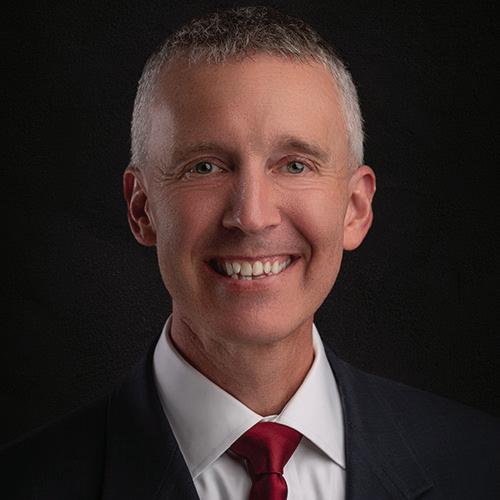
be firm. Thankfully, we now have tax certainty with the passage of the ‘One Big Beautiful Bill.’ It contains a lot of incentives to build and invest in America. Once we get through the tariff drama, the story should be one of reaccelerating growth for the balance of the year.”
Your use of the term “hesitancy” is interesting. We are getting a sense that a lot of businesses have been struggling to deal with uncertainty caused by Trump administration policies during the first half of the year (we’ll address those more specifically later). What do you think?
“According to business and CEO confidence surveys, they’re saying that uncertainty is affecting business decisions and activity. It first showed up in pulling back on expansion plans because they didn’t want to risk expanding in an area where they wouldn’t be cost competitive. Now the uncertainty is being amplified because it is not just about policies, but uncertainty about the health of consumers and their customers. If we can get the
BIZTIMES MILWAUKEE: How do you foster a mission and value-based workplace culture?
KING: “A clear and compelling mission has the power to awaken passion and commitment in people. It creates a shared sense of purpose that guides not only what we do, but how we show up for one another and the community we serve. From a leadership perspective, we actively root our strategic decisions and problem-solving in our values. By staying grounded in both mission and values, we’ve built a workplace culture where people are motivated by meaning.
BIZTIMES: What does innovation and continuous improvement look like at Hunger Task Force?
KING: “At Hunger Task Force, innovation starts with listening. We believe the people closest to the work—our staff, board, volunteers, partner organizations, donors, and especially the people we serve—are our greatest source of insight and inspiration.
By fostering a culture that actively listens to these stakeholders, we stay grounded in real-world needs while remaining agile in how we respond to them. Continuous improvement isn’t just about efficiency or scale, it’s about relevance and impact. When we take the time to listen and respond, we unlock the kind of innovation that advances our mission. It’s not innovation for its own sake; it’s innovation with purpose.”
BIZTIMES: How integral are partnerships with the Milwaukee business community to sustain your operations?
KING: “Collaboration is at the heart of who we are at Hunger Task Force. Our organization is built on partnerships — not just as a strategy, but as a core part of our culture and identity. We understand that ending hunger requires shared effort, vision and responsibility. The Milwaukee business community plays a vital role in sustaining our work. But more than that, we see partnership as mutually beneficial. Businesses that engage with Hunger Task Force have a meaningful opportunity to give back, activate their employees and foster a deeper sense of mission and purpose within their own organizations. These partnerships help companies advance their own goals, strengthen their culture and drive productivity through purposedriven engagement.”
BIZTIMES: What challenges and opportunities do you see on the horizon in 2025?
KING: “As we look ahead, we know many individuals and families will continue to feel the pressure of rising costs, particularly when it comes to housing and groceries. These aren’t abstract issues; they impact family stability. While shifts in federal policy will influence the broader landscape, our focus remains on how we respond thoughtfully, responsibly and with integrity to the needs of our community. At the same time, I see tremendous opportunity in the strength and generosity of Milwaukee. This is a city

that shows up with compassion and a shared belief that everyone deserves dignity and access to healthy food. Partnerships across sectors will be more important than ever. When business leaders, nonprofits, community organizations and residents come together with shared purpose, we can build a safety net that’s not just reactive but also resilient.”


uncertainty resolved early in the Trump administration, we can have more clarity for the balance of it. In a way, this is like ripping the Band-Aid off and we’re just going through the painful part now.”
As for specific issues, let’s start with tariffs. During the first half of the year Trump has imposed numerous tariffs on a host of countries, then he made several changes to the amount of the tariffs and has suspended some. How have the tariffs affected the economy so far this year and what impact do you think they will have moving forward? Are we seeing or are we going to see a severe drop in trade activity?
“The tariffs have had a mixed impact on the economy. While some industries have benefited from the protectionist measures, others have faced increased costs and supply chain disruptions. Moving forward, the uncertainty surrounding tariffs may lead to a cautious approach in trade activities, potentially causing a drop in trade volume. However, administration officials have said that they hope the tariffs can be used as leverage to pry open the foreign markets. In that case, we could see more trade activity. The trade deal with Vietnam is an experiment of whether that will work. The U.S. will impose 20% tariffs on goods from Vietnam, and Vietnam will apply 0% tariffs on U.S. goods. The problem, of course, is whether the people of Vietnam want or can afford what we produce. I don’t see a lot of them buying large U.S. automobiles.”
Another big move by the Trump administration has been the intense crackdown on illegal immigration, including stepping up efforts to deport illegal immigrants. Is this having any impact on the labor market and how do you think the labor market will be affected as this push continues?
“The crackdown on illegal immigration has led to a tighter labor market, particularly in industries that rely heavily on immigrant labor, such as agriculture and construction. As the push continues, we may see increased labor shortages and upward pressure on wages in these sectors. There’s evidence to indicate that the illegal immigration crackdown is also weighing on legal immigration. It takes time, moving and retraining for people to switch from a job in one industry to a job in another industry. We will also likely see continued automation and investment in technology to fill the void. The ‘One Big Beautiful Bill’ lowers the cost to businesses of making that switch. We could continue in this uncomfortable situation where companies are afraid to hire because they don’t know what demand will look like, but they’re also afraid to fire because recruiting and training is time-consuming and costly.”
Led by the work of the new Department of Government Efficiency (DOGE) the Trump administration has directed substantial cuts to federal spending. What impact do you see that having on the economy in the short and long term?
“In the short term, the cuts to federal spending may lead to reduced government services and potential job losses in the public sector. We’re already seeing that in the labor data with federal employment shrinking. There has been a steady decline in federal employment this year that will likely pick up steam. There are also longer wait times to speak to a representative at many government agencies. Even the economic data releases themselves have been affected. The Bureau of Labor Statistics collects data on prices across the country, but with staffing shortages they’ve had to cut back on the amount of data they actually collect. That’s affecting the reliability of those economic indicators. However, in the long term, if the cuts lead to a more efficient government, it could result in a more sustainable fiscal position and potentially lower taxes, which could benefit the economy.”
The Federal Reserve has held interest rates steady this year, despite President Trump’s complaints and criticism of Federal Reserve Chair Jerome Powell. Is the Fed doing the right thing? Do you anticipate any changes to the federal funds rate the rest of the year?
“Inflation isn’t showing signs of accelerating, yet. The labor market is softening, but it’s still solid. Because Fed officials think inflation will slowly build over the next few months, they feel like they are justified in holding rates where they are. I think it’s more likely that companies will end up eating of lot of the tariff costs, which will weigh on profits, which will weigh on growth. If my view is right, then they should cut, but if their view is right, then they should stay on hold. Sometimes you just have to run the experiment and see how things play out. Thankfully, the Fed has demonstrated a willingness and ability to quickly and decisively change course.”
Have we finally gotten inflation under control? Or are tariffs and the labor shortage going to drive up prices? What do you expect for the U.S. inflation rate for the rest of the year?
“While inflation has been relatively stable, imposing tariffs will affect prices, profits, or production. It’s likely to affect all three to various degrees. Thus far, tariffs are showing up in only a handful of consumer prices like imported food items. It will likely show up in car and electronic prices, but the extent to which it will depends on the tug of war between businesses trying to hike prices and trying to compete for market share. That’s why nothing is a foregone conclusion in economics. The labor market shortage is mostly in certain industries, but productivity is improving, so higher wages aren’t inflationary. It would be different if
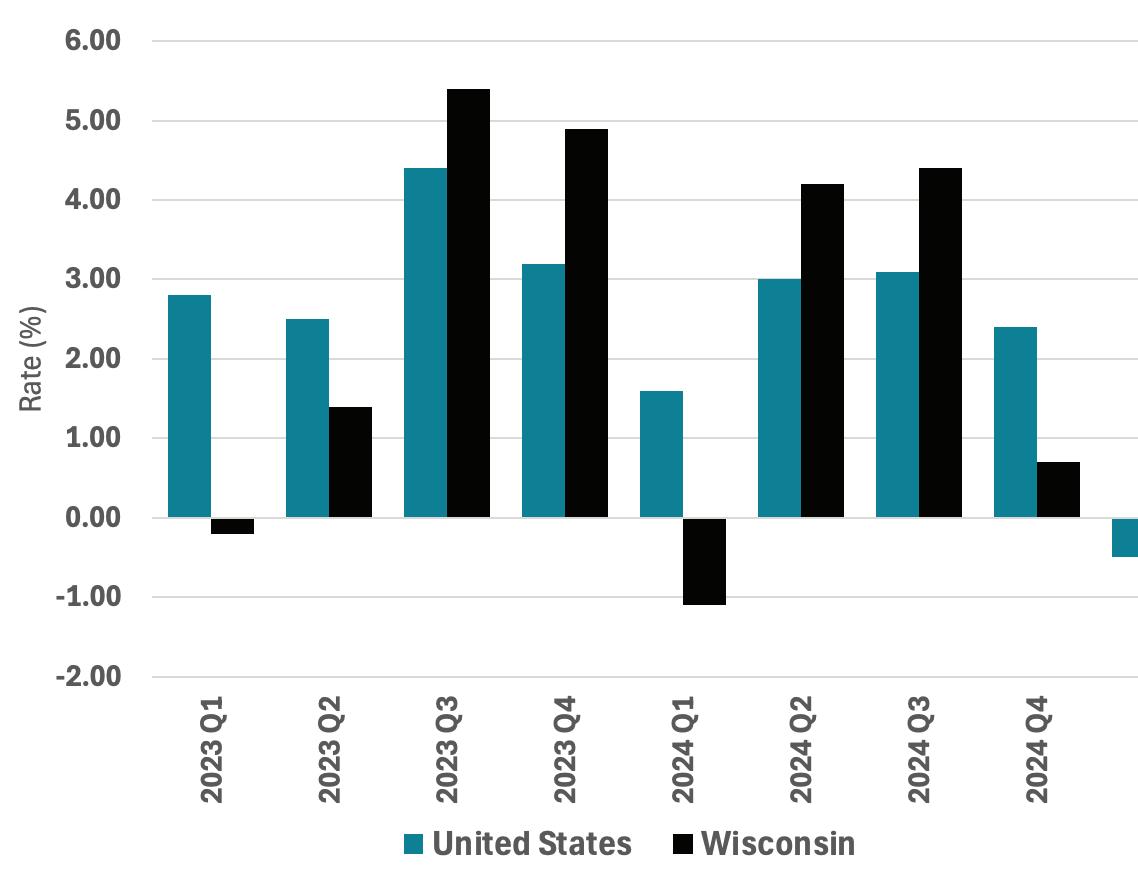
Source: U.S. Bureau of Economic Analysis

BIZTIMES MILWAUKEE: How does your company foster innovation?
COLÓN: We act compassionately, serve humbly and lead courageously. We embrace bold ideas and challenge the status quo, beginning with a culture that engages our colleagues.
BIZTIMES: What did you learn from the last three years? How is your company stronger?
COLÓN: When I became CEO, LSS was facing significant financial challenges. I asked specific questions of my team. Their answers transformed our organization and inspired innovative solutions that brought millions to the bottom line, stabilized infrastructure, expanded impact, and restored colleague morale.
BIZTIMES: What is your favorite success story?
COLÓN: Our financial turnaround represents more than financial success. It reflects trust, innovation, and a renewed commitment to mission. One of my favorite success stories is when a colleague shared that they once considered leaving but now see LSS as a place to grow, not just survive. That’s the kind of impact that matters most.
BIZTIMES: What failure has taught the most?
COLÓN: One lesson came when a highly anticipated major gift didn’t come through. It taught me to be patient. In another case, we received a completely unexpected $1M anonymous donation. It taught me to have faith.
BIZTIMES: Where do you see your company in one to five years?
COLÓN: We will aim to:
» Solidify LSS as a national leader.
» Advance fair pay, responsive government systems and sector sustainability.
» Invest in prevention and early intervention services that address social determinants of health (SDOH).
BIZTIMES: What is your most important responsibility to your employees?
COLÓN: Empowerment and growth - to build a culture where people are valued, supported and inspired to lead from wherever they are in the organization.
BIZTIMES: What is your most important responsibility to your customers?
COLÓN: Compassion is our “secret sauce.” That means we listen deeply to meet the needs of the people we serve with dignity, respect and personalized care.

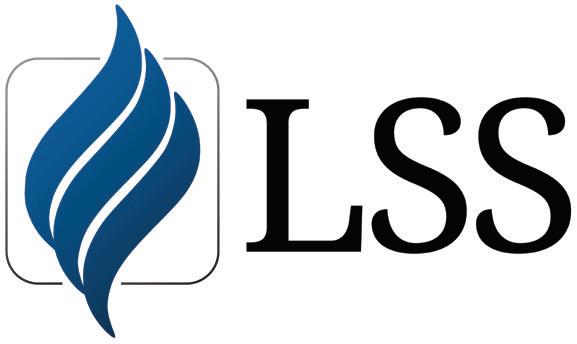

we saw productivity fall.”
The stock market has been on a roller coaster ride this year. Is that a reflection of the overall economy? What do you anticipate from equity markets for the rest of the year?
“The volatility in the stock market reflects the broader economic uncertainties and policy changes. The market anticipates the economy. Back in early April, the market was expecting a recession, but with the dialing back of the tariffs, the market is saying a recession is a lot less likely. This is why markets can be very confusing. Markets price in expectations and move when reality defies those expectations. For the rest of the year, we can expect continued fluctuations as markets react to new information and policy developments. However, the underlying fundamentals of the economy remain strong, which should provide some support to equity markets.”
Israel’s war against Hamas in Gaza rages on. Israel and Iran have been engaged in fighting, and the U.S. also exchanged hostilities with Iran. What impact will these events have on the economy? Are we in danger of a major global catastrophe that would devastate the world’s economy?
“The conflict in the Middle East poses a risk to global economic stability, particularly through its impact on oil prices and geopolitical tensions. It’s well above my paygrade to say whether a global catastrophe is likely or not. If it happens, a person’s 401(k) balance will be the least of his worries. Assuming we don’t get that catastrophic outcome, remember that the U.S. has been a net exporter of oil for many years. Consumers will feel the pinch of higher gasoline prices and that can affect spending on all sorts of goods and services, but motor fuel is only about 3% of a typical household’s spending. That’s half of what it was during the 2012-2014 period. It’s a situation that needs close monitoring, but it’s more of a political and military issue than a household finance issue.”
Earlier this month, Trump signed the comprehensive “One Big Beautiful Bill” into law. What impact do you think it will have on the economy?
“For most people, passing the bill will feel like a continuation of tax policy, not a tax cut. A higher standard deduction, child tax credit, and no income taxes on tips or overtime are all things that can show up quickly in people’s pocketbooks. They may be subtle for the overall economy, but really significant for the individuals who benefit. For many businesses, the incentives to invest in property, plant and equipment could be a gamechanger for the economy. Those investments can not only
help growth this year but serve as a solid foundation for future growth. There are a lot of legitimate concerns about the deficit effects. Those do need to be dealt with. A deficit of 6.5% of gross domestic product during an economic expansion is unjustifiable. It needs to get to something more sustainable, like 3%, but it doesn’t have to happen all at once. Until that important issue is resolved and there’s a path to 3%, interest rates are likely to keep bouncing around at these relatively high levels. Congress will have another shot at using budget reconciliation in 2026. While 2025 was all about getting a tax deal, 2026 will likely focus on bending the spending curve of the government.”
Looking ahead, after a tumultuous start of the year politically and economically in the United States, do you think the economy will slip into a recession during the second half of the year, or are we going to see growth?
“Despite the challenges, the economy is likely to see growth in the second half of the year. The resilience shown in the second quarter and the potential positive impacts of policy measures suggest that a recession is unlikely. However, continued vigilance is necessary to navigate the uncertainties. President Trump front-loaded a lot of the disruptive policies to try to get those out of the way. By the end of July, which is part of the third quarter, we should have a lot more clarity on policy and businesses can get back to the business of serving clients instead of waiting and watching what policy changes will or won’t happen.” ■

Source: S&P Dow Jones Indices, FRED




Source: Fanny Mae, Federal Reserve, FRED

BIZTIMES MILWAUKEE: What did you learn in the last year?
ANTHONY CRUZ: “In my first year of serving at MATC, my sense of how important the college is to our community has been continually reaffirmed. During my many meetings with our civic leaders, our community-based organization partners and our elected officials, I have gained a true appreciation for how the college impacts our community and how it serves our district residents. Our region needs the skilled graduates we produce to help fill thousands of job openings.
BIZTIMES: What challenge have you learned the most from?
CRUZ: “The last six months have been fraught as the number of federal executive orders involving education proliferates, and Congress mulls possible changes and the potential elimination of funding and federal programs the college depends on. Despite this uncertainty, we are making sure that we are ready under any circumstances to serve our students and our community.
At one point, changes were proposed that would have eliminated Pell Grants for students who are less than half-time and another that would require students to increase credits earned to be considered full-time. We engaged with our lawmakers, U.S. representatives and partners to raise concerns about these proposed changes. We also remain connected to the national associations that advocate for two-year colleges, as well as the Wisconsin Technical College System, to be apprised of developments and updates that affect our students and the taxpayers in our district.”
BIZTIMES: What do you see as your most important responsibility to students and families?
CRUZ: “My most important responsibilities are to ensure that we have up-todate curricula so our graduates have the technical knowledge, professional skills and career essentials our regional employers are looking for. The college currently works with more than 900 partners that help craft courses and curriculum to ensure MATC teaches the skills employers want and need their workers to have. We will always need that expertise. It’s vital we understand the needs of industry and the workforce.
My other important responsibility is to ensure that we have support services in place to help students overcome barriers and obstacles to getting here, staying here and graduating from here. We are always looking for new ways to help everyone succeed.”
BIZTIMES: Do you have any new services to announce?

to equip students with the foundational knowledge and practical skills necessary to pursue biotechnology careers.
The college is also working to establish a peer mentoring program for students to enhance their experience and to provide yet another level of support.”
CRUZ: “MATC will play a pivotal role in advancing personalized medicine in Wisconsin’s federally funded biohealth tech hub by training highly skilled professionals to work with these cutting-edge technologies. The college established a Biotechnology Laboratory Technician program, designed 700

BY ASHLEY SMART, staff writer

LOCAL MANUFACTURERS are working to control what they can in an environment of constant economic uncertainty driven by President Donald Trump’s ever-changing tariff policies.
Since early this year, economic uncertainty has continued to slow down planned capital investments and improvement projects for the state’s manufacturers, said Chris Baichoo, executive director and CEO of Madison-based WMEP Manufacturing Solutions.
“The water is still very murky,” said Baichoo. “Tariffs are really creating a lot of margin compression and input costs are rising. Manufacturers are competing for a smaller slice of the pie.”
Manufacturers are working to implement whatever cost-saving and optimization measures they can now, regardless of the tariffs, said Baichoo.
WMEP is working with local manufacturers to help them reduce lead times, improve their quoting process, boost their speed and optimize the layout of their facilities. The organization can also help manufacturers break into new, profitable markets including life sciences and defense.
“If a company has a fixed amount of resources, we can help them take those resources and put them into markets that are growing,” said Baichoo. “These are things that really help offset tariff costs.”
WMEP is encouraging clients to be pragmatic when considering ways to offset tariffs.
In the coming months, Baichoo believes manufacturers that sought to offset tariffs by purchasing larger inventories of supplies at the start of the year will find themselves in “more dire” conditions as those low-cost materials run out.
Already, WMEP is seeing some clients considering alternatives like redesigning products or swapping out materials. In some cases, manufacturers are evaluating if it’s cheaper to have products shipped into the U.S. in pieces.
“I think we’re on the precipice of it getting to be ugly, because a lot of that (cheaper) material is running out,” said Baichoo.

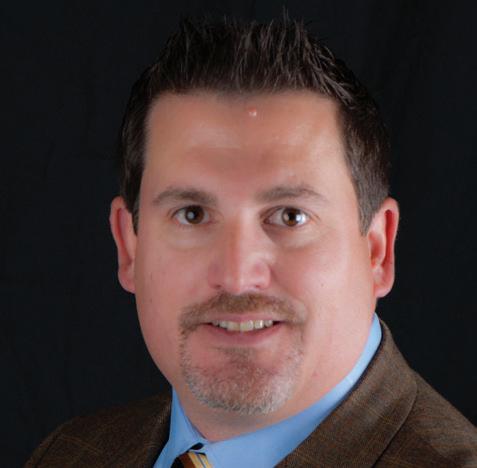
For metal fabricators like Milwaukee-based Argon Industries, the only realistic tariff mitigation option when the rate for metals is so high is passing along price increases to customers.
Gregory Clement, president of Argon Industries, began receiving a new batch of price increases from suppliers in the middle of June. Most of those increases, which went into effect on July 1, are being passed on to customers because Argon Industries is not able to absorb them.
He’s prioritizing transparency and making sure clients are fully informed of what Argon Industries is paying for materials.
“It’s basically just constantly keeping the customer informed about what’s going on,” said Clement. “When we’re quoting, they see that number, and then as we’re updating pricing, they see that number as well.”
Argon Industries used to be able to lock in materials three months ahead of time to help mitigate price increases. Now, the business is often asked to pay for materials at the time they’re received.
In the coming months, Clement said he’ll be keeping an eye on whether the U.S. finalizes negotiations with Mexico and Canada. Argon Industries has relied heavily on Canada as a supplier of aluminum.
Clement says increasing tariffs on Canadian goods when the country has served as a good supplier “doesn’t make any sense.”
“It is stressful because it affects the whole company,” he said. “We’re constantly monitoring pricing and repricing. It takes a lot of time and effort.”
Ed Paradowski, president of Kenosha-based Reflective Concepts, also finds himself in a tough spot as a local metal fabricator.
Reflective Concepts is one of a handful of

Wisconsin manufacturers using metal that goes through an anodizing process twice, creating a highly reflective material. Reflective Concepts uses that metal to make components for the lighting industry. Globally, only two suppliers in the world sell this highly reflective metal – one is in Germany and the other is in Italy.
When the first round of tariffs was introduced in February at 25%, Paradowski leveraged his relationships with his suppliers to find operational efficiencies like placing larger orders and paying in euros versus dollars. But then, the second round of tariffs at 50% hit in June.
“We’d already grabbed all the low hanging fruit, so any opportunities for further efficiency gains really weren’t there,” said Paradowski. “This was a pure 25% incremental hit.”
Basic metals like carbon steel cost around 45 cents a pound. The metal that Reflective Concepts uses costs between $7 and $10 a pound, not adding in tariffs.
The company has implemented price increases on some items to help cover costs. The increases vary greatly and can be anything from fewer than 5% or up to 20% depending on the product.
While Paradowski supports Trump and his goals of promoting fair trade while bringing manufacturing back to the U.S., he questions the president’s methods in doing so.
“I question it sometimes, because the easiest way to get people to put their checkbook in their pocket and button it is to create uncertainty,” Paradowski said. “Right now, there’s just an awful lot of uncertainty.” n
BIZTIMES MILWAUKEE: How does Palermo’s foster innovation?
NICK FALLUCCA: Innovation is at the heart of everything we do, not just in our products, but in how we run our business. Our mission is to deliver a great pizza experience, and that means embracing innovation across every facet of the company. Whether it’s improving HR processes or finding better ways to price new projects, we empower our people to try new things. In this industry, you either innovate or someone else will do it better.
BIZTIMES: What have you learned from the past three years? How is your company stronger?
FALLUCCA: I think we learn something new every day, but if the last three years have taught us anything, it’s that you have to be adaptable. The retail landscape has changed dramatically. There’s been high turnover, and retailers expect higher margins, more velocity, and for brands to work harder to earn their shelf space. That constant change means having the same conversations with new people over and over. We’ve learned how to drive out inefficiencies without losing what makes us special: our great food, our focus on people, and our commitment to our customers. Those are the things that set us apart.
BIZTIMES: What is your favorite success story?
FALLUCCA: Screamin’ Sicilian continues to be the brand I’m most proud of. We launched it in 2014, and it’s become a multi-million-dollar brand. It’s a premium craft frozen pizza that customers love, and we’ve been able to keep it fresh and growing through continuous innovation.
I’m equally as proud of our people. They are the heart of our business. We’ve been recognized as a “Great Place to Work” for four consecutive years, a recognition based entirely on feedback from our employees, surveyed in eight different languages. That means a lot to me.
BIZTIMES: Where do you see your company in 5 years?
FALLUCCA: Over the next five years, we will continue to innovate, not only in frozen pizza, but across the broader food service industry. Frozen pizza is a $6 billion industry, but the total pizza market is over $60 billion. With our new West Milwaukee facility, we have a tremendous opportunity to serve that market and continue growing. The future looks bright.
BIZTIMES: Does your company have any new products, services to announce?
FALLUCCA: Yes, we’ve recently launched two exciting new products: Cheez-It™ Frozen Pizza and RAGÚ® Frozen Pizza. Both are fun, unique collaborations that are resonating with consumers. We’re also launching Stranger Things Pizza in partnership with Netflix — that’s coming soon and includes a fun surprise for fans of the series.

In addition, we’ve expanded our operations with our new 250,000 squarefoot, state-of-the-art food manufacturing facility in West Milwaukee. This new facility will drive even more innovation in the pizza category and support our continued growth.

3301 W Canal • Milwaukee, WI 53208 414-643-0919 • palermospizza.com

BY SONIA SPITZ, staff writer

UNCERTAINTY CONTINUES to dictate decision-making among employers and employees in the labor market. While most industries are swaying employer-friendly with an abundance of applicants and a lack of open positions, a majority of employers remain hesitant to hire while candidates remain hesitant to make any drastic moves.
Wisconsin’s unemployment rate as of May this year is 3.3%, up from 2.9% in May of 2024, according to the U.S. Bureau of Labor Statistics.
Similarly, the national unemployment rate has risen slightly since May of 2024 from 4% to 4.2%.
While the rise is slow, “it’s definitely creeped up a little bit,” said Ryan Festerling, president and CEO of Brookfield-based QPS Employment Group. “I would say that uncertainty is both political and economic.”
In addition to a slight increase in unemployment, employee turnover is down and retention is up, said Festerling. During years of uncertainty following the COVID-19 pandemic, turnover was high as people faced a rapidly changing job market. Today, people are staying longer at their jobs and exercising more caution in finding a new job as uneasiness returns in light of an unstable economy and new regulations proposed by the Trump administration.
Certain industries have maintained some immunity to the ups and downs of the labor market, including some skills and trade-type sectors like en-
gineering controls, electrical welders and computer numerical control (CNC) jobs. These industries have remained in the candidate-friendly market alongside others like health care and technology.
Unemployment within the skilled trade sector is low and is one of QPS’s most popular picks for job candidates currently. QPS clients are looking at both entry-level skilled trade jobs as well as high-level jobs that require additional training and new proficiency in automation.
“Several manufacturers are looking to automate as much as they can in their facilities,” Festerling said. “If a company finds a way to identify efficiencies and have less low-skilled labor, it actually creates jobs.”
For example, if a manufacturer bought a new $2 million machine, the company would require someone to install it, program it and monitor it, he explained.
Hot industries like finance and accounting and hospitality continue to be challenging for employers as the jobs in those sectors are slightly more nebulous and require more specific credentials to obtain. Those markets are softening, Festerling said.
The narrative of artificial intelligence often revolves around the idea that without embracing it, companies and employees risk falling behind.
The same is now true for the labor market and
its modern hiring practices.
High performers in the job market are widening the skills gap between themselves and the next class of workers by adopting AI into their workflow, said Amanda Daering, founder and CEO of Milwaukee-based talent recruitment firm Newance.
“High performers aren’t just using AI to be efficient, they’re using AI to learn new concepts, to integrate different ideas better,” Daering said. “For those people who aren’t yet embracing AI or are maybe uncomfortable with it, the gap is widening between their performance and their output.”
The surge of AI automation is coming not only with new efficiencies, but with challenges like inauthenticity in applications and mass applying.
Daering agreed that while most industries are swinging employer-friendly, employers are struggling with an increased number of AI-generated applications, which lack authentic content. Those resumes are often being sent in a mass application spree and are not tailored to employers’ criteria.
The Trump administration’s massive crackdown on illegal immigration is sending shockwaves through the labor market as impacted employers and employees struggle to determine what comes next.
Many employers are leaning into their em-
ployee assistance programs or employee resource groups as immigration policy decisions are made on the federal level.
“The uncertainty creates hesitation, and in that hesitation there’s a lot of mistakes that are made,” Daering said. “Even waiting can be a mistake.”
In more severe cases, immigrant workers are being stripped of their residency status or work permitting, Festerling said.
The effect is twofold: a person with residency status who was legally permitted to work in the country is no longer permitted to work here, and the community responds with heightened anxiety.
“They all know someone,” Festerling said. “There’s stories that are being told – some are true, some are not true – but they all cause uncertainty and nervousness.”
At Pewaukee-based VJS Construction Services, the uncertainty has not deterred immigrant employees from applying.
While the number of immigrant applications hasn’t increased, VJS isn’t seeing that pool of candidates dwindle either. VJS hires more U.S. citizens than it does immigrants with legal documentation, but the volume of immigrant worker applications has remained steady “beyond whoever is sitting in the Oval Office,” said Ryan Niegocki, manager of field operations at VJS.

Years ago, employers often focused on mission and purpose when it came to hiring. Today, with a new generation entering the workforce, employers are finding that candidates are seeking more transparency in their roles as well as meaning in their work.
“The clearer and more effective you are about how you’re going to decide, when you’re going to decide, and then to actually decide, will be very

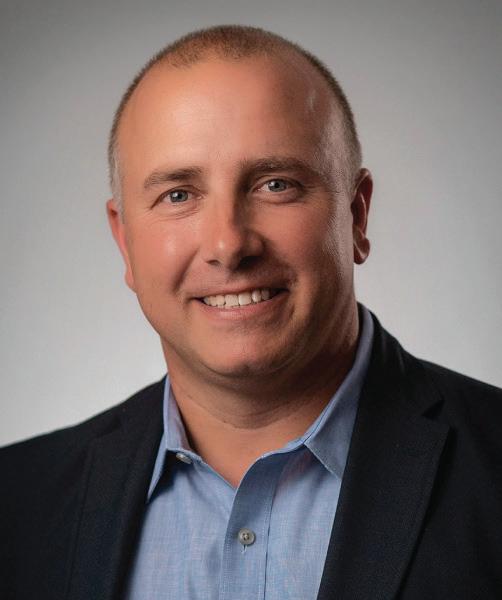
powerful,” said Daering.
In addition to transparency, taking care of current employees, remaining curious about what is happening just outside of the business, and creating flexible work arrangements to combat uncertainty is increasingly important, said Festerling.
“We’re all trying to figure out the triangulation between immigration, tariffs and business uncertainty and how they’re all going to interplay and interact,” he said. ■











BY SAMANTHA DIETEL, staff writer
THE NONPROFIT SECTOR has faced tremendous uncertainty this year amid federal funding cuts.
Since President Donald Trump took office in January, his administration has sought to cut government spending. Many of those funding cuts have affected nonprofit organizations in Milwaukee and across Wisconsin, and the possibility of future cuts loom.
This period of uncertainty for nonprofits is likely to continue for the rest of the year, said Tony Shields, president and CEO of the Wisconsin Philanthropy Network.
“Due to the dynamic process of creating federal legislation and the extensive discussions and information involved, continuous challenges and uncertainty are expected throughout the year,” Shields said.
Nonprofits and social service organizations are experiencing “increased competition for private and philanthropic dollars due to federal funding cuts and fewer federal funding opportunities,” the Federal Reserve Bank of Chicago reported in June.
Organizations serving low-income communities have also reported concern about the impact of reduced federal funding, such as on the availability of child care, according to the Federal Reserve.
The Wisconsin Philanthropy Network has heard similar concerns from grant makers and grantees. Organizations receiving significant federal funding are financially vulnerable, including those addressing basic needs such as food insecurity, housing and health care, Shields said.
“Some nonprofits believe philanthropy can compensate for federal cuts, like during COVID-19,” Shields said. “However, this is unrealistic because pandemic relief was supported by both philanthropy and federal programs. Nonprofits should not rely on this belief.”
Hunger Task Force, Milwaukee’s network of local food pantries, has experienced two significant federal funding cuts so far this year.
In the spring, the U.S. Department of Agriculture canceled the Local Food Purchase Assistance program, which provided funds for food banks to purchase food from local farmers and producers. Last year, Hunger Task Force received $250,000 through the program to purchase vegetables, beef and fish from Wisconsin producers.
At the time the LFPA was canceled, vegetable farmers had already planted seeds for this year’s growing season. Hunger Task Force secured funding from a donor to continue this program through its network of food pantries, said Matt King, CEO of Hunger Task Force.
“Hunger Task Force decided that we were going to honor our commitment to these farmers and make the investment to continue the program, because we believe that it’s the right thing to do,” King said. “These folks are vital to our state and local economy and food system, and their produce provides fresh and healthy foods that pantries don’t often receive.”
Soon after the USDA canceled the LPFA program, the USDA also canceled food bank deliveries nationwide, including $615,000 in food orders for Hunger Task Force. The canceled deliveries to Hunger Task Force included 13 semi-truck loads of milk, chicken, cheese, pork and eggs scheduled to arrive in summer and fall.
Considering the rising cost of groceries, having these healthy foods available at Hunger Task Force pantries is particularly crucial, King said.
The canceled items were also “a significant backbone of the food supply that we had anticipated for the second half of this year,” he said.
“Our food inventory is still strong, and so while those cuts were disruptive, they were not disastrous,” King said. “We have ensured that our local food pantry won’t feel those cuts. We’ve had to do that by making some food purchases, and so it has had a budget impact for our organization, and we have incurred unanticipated expenses as a result.”
Looking ahead, the federal reconciliation bud-
get bill, known as “The One Big Beautiful Bill,” which Trump signed into law on July 4, includes at least $230 billion in cuts to the Supplemental Nutrition Assistance Program, or FoodShare in Wisconsin, and structural changes to the program.
As a result of those impending changes to SNAP, Hunger Task Force expects to see an increase in need and an increase in visits to food pantries, King said.
“This will be the single most devastating program change and cut that food banks and anti-hunger organizations across the country will see,” King said of the cuts to SNAP. “In Wisconsin, over 700,000 people participate in a SNAP program each month, including 240,000 in Milwaukee County, so the cuts in SNAP … will significantly increase hunger in our community, and will be hard to undo in the future.”
The Medical College of Wisconsin, which received $113 million in funding from the National Institutes of Health in fiscal year 2024, faces the possibility of future NIH cuts that could force the academic nonprofit to shrink its research enterprise.
Trump’s budget request for fiscal year 2026 includes an approximate 40% reduction in funding for the NIH, equaling nearly $18 billion. This indicates that significant funding cuts for MCW may be on the horizon, Dr. John Raymond, president and CEO of MCW, previously told BizTimes.
While MCW has strong private sector relationships, those companies “have a limited capacity to absorb such a tremendous cut that is happening in such a short period of time with no warning whatsoever,” Raymond said.
“In the long term, we may well have to shrink our research enterprise,” Raymond said. “If the NIH funding is reduced by 40%, you can’t go to the private sector and make up $20 billion of a deficit, and you certainly can’t pivot quickly to be able to fill those gaps.”
MCW has also had to navigate other threats to its NIH funding this year. In February, the National Institutes of Health issued guidance that capped the indirect cost reimbursement rate for all current and new NIH awards to 15% of grants effective Feb. 10, but a federal judge has since blocked that guidance. The NIH also began terminating research grants related to LGBTQ+ issues, diversity, equity and inclusion and other topics. MCW lost $6.6 million as a result of those grant terminations.

GMF SURVEY REPORTS ‘OVERWHELMING CONCERN’ ABOUT FUTURE
In May, the Greater Milwaukee Foundation surveyed recipients rep-
resenting grantees with open grants and organizations with agency endowments at the foundation to learn whether or how national changes may be influencing their work.
Based on 103 responses to the survey, the top three challenges nonprofits are facing are: an increase in community needs and demands for services; a reduction in funds and/or funding freezes from the federal government; and policy changes affecting services they can provide.
“Although a snapshot in time, the survey results underscore what we continue to hear from nonprofits at sector-specific convenings,” said Carrie Scholz, director of community leadership at the Greater Milwaukee Foundation.
Scholz said the survey responses indicate “an overwhelming concern about anticipated significant cuts on the horizon.”
“The nonprofits express concerns about how these cuts will impact their immediate capacity to deliver services and ultimately remain open,” Scholz said. “Many nonprofits are turning to one another to leverage resources so that community members can access what they need for as long as possible. As a next step, the foundation, in collaboration with others, is exploring how to further support nonprofit partners in this changing environment.”
A recent attempt to cut federal funding for AmeriCorps has also created instability for some nonprofits in Wisconsin.
At the end of April, the Trump administration cut funding for all Serve Wisconsin AmeriCorps programs. As Wisconsin’s AmeriCorps agency and state Board for National and Community Service, Serve Wisconsin administers federal AmeriCorps funding to organizations in the state.
On June 5, a federal judge ordered that the Trump administration must restore AmeriCorps funding to Serve Wisconsin programs, as well as to other states that sued the Trump administration in April, according to Wisconsin Watch reporting.
“We are excited that several programs have been able to welcome back AmeriCorps members who were serving prior to the grant terminations, and that others are moving forward with previously planned summer AmeriCorps members, including positions at youth camps and on conservation crews,” said Jeanne Duffy, executive director of Serve Wisconsin.
Many AmeriCorps members serve in schools, medical clinics, nonprofit organizations or local government offices. These AmeriCorps members provide literacy and math tutoring, substance use
recovery coaching, support for youth who are homeless, and other services. Many AmeriCorps members receive living stipends during their period of service. AmeriCorps was founded in 1993.
In September, Serve Wisconsin announced it had received $12.8 million in AmeriCorps funding for 875 members.
Serve Wisconsin AmeriCorps programs include: Boys & Girls Clubs of Greater Milwaukee’s ClubCorps, College Possible Milwaukee, LibraryCorps, Marquette University’s 414 Fellows, Milwaukee Christian Center’s YouthBuild program, Milwaukee Justice Center’s MJC AmeriCorps, Public Allies Wisconsin, Racine Zoo AmeriCorps program, Teach for America Milwaukee, as well as other statewide programs.
The AmeriCorps cuts created uncertainty for Milwaukee Christian Center’s YouthBuild program, which depended on AmeriCorps funding to support nine members of the program’s current cohort.
“It was really heartbreaking to actually see that impact the young people that we serve and the staff that we serve in our community directly,” Andrea Grittner, director of development and communications at Milwaukee Christian Center, told BizTimes in May. “We had fear that this was coming, but to actually see it impact our young people was kind of a shock and a scary situation.” ■






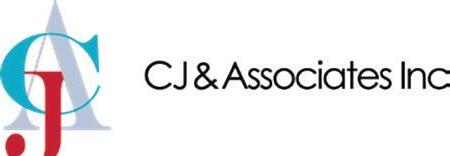


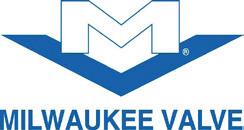
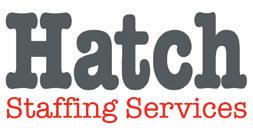



BY MAREDITHE MEYER, staff writer
CONTINUING WITH THE overarching theme of economic uncertainty, consumers are generally exercising caution in their spending habits these days.
Much of that caution has been driven in recent months by President Donald Trump’s trade policies and questions over how tariffs could impact inflation rates. That’s on top of a host of other factors, such as persistently high food prices, housing costs and geopolitical conflict, all contributing to an overall sense of “nervousness” among the average consumer in 2025, said Angie Belz, Ph.D., associate professor of management and marketing at Concordia University Wisconsin.
Initial fears of an inflation spike following Trump’s announcement of widespread tariffs in April subsided with a 90-day pause. The U.S. Consumer Price Index in June was up 2.7% from a year ago, a slight increase from 2.4% in May.
With trade deal negotiation deadlines extended twice, now to Aug. 1, uncertainty lingers for many consumers, and their spending has slowed.
“I think all of us can anecdotally say, ‘Yes, people are tightening their belts, the prices are higher,’ but the data is showing that and that people are pulling back on spending,” Belz said, especially on “big-ticket” items.
U.S. consumer spending was down 0.1% in May, led by a $49.2 billion decrease in spending on goods. Meanwhile, spending on services increased by $19.9 billion, according to the Bureau of Economic Analysis.
Earlier this month, the head of the National Retail Federation cited “prolonged uncertainty
surrounding the economy, tariffs and trade policy” and consumers adopting a “wait-and-see approach” with their household budgets as contributors to a 0.33% month-over-month decrease in total retail sales (excluding automobiles and gasoline) in June.
“Economic fundamentals haven’t been disrupted yet and shoppers still have the ability to spend on priorities, but the economy is gradually slowing and there has been an impact on the psyche of consumers,” said NRF president and CEO Matthew Shay. “While passage of the ‘Big Beautiful Bill’ is clearly supportive of economic growth, unresolved and restrictive trade policies remain a significant headwind.”
Data collected by the University of Michigan bears out the effect of tariff uncertainty on the collective American psyche, with consumer sentiment plummeting 29% from December to May, underpinned by the steepest three-month percentage decline seen since the 1990 recession.
The six-month downward trend broke in June, rebounding 16% over May. However, sentiment is still down 18% from December and 11% from this time last year, hinting at a possible economic slowdown and increase in inflation on the horizon, according to the university’s latest Survey of Consumers report, released June 27.
“Consumers continue to be concerned about the potential impact of tariffs, but at this time they do not appear to be connecting developments in the Middle East with the economy,” according to the report.
While Israel’s war in Gaza is not currently seen as an immediate threat to the global economy, Belz
warned of its background effect on consumers.
“Anytime there’s geopolitical conflict, people tighten their belts a little bit,” she said. “The number one concern is going to be gas prices, and then the ripple effect of gas prices.”
A recent report from Madison-based rewards app Fetch, which collects and analyzes consumer purchase data from millions of user-submitted receipts from grocers and other retailers, sheds light on just how consumers have adjusted their behavior amid tariff uncertainty.
Since March, average households are spending $20-$35, or 14%, more per week than they were last year, with trip frequency up 9% year-overyear.
“They’re spending more on key categories, like pantry and essential items while prices are stable, and buying more products in anticipation of higher prices,” the report states.
One trend that came out of the post-pandemic inflation surge – and is bound to continue under the current climate – is the shift toward value-driven purchases. Consumers are trading down from name brands to store brands in a variety of categories to stretch their dollar.
This shift presents an opportunity for many businesses: “Where they’re not maybe selling the higher priced items, they can make up some of those sales in volume,” said Belz.
After bringing numerous national, some high-profile, brands into its mix in recent years, Menomonee Falls-based Kohl’s Corp. is now leaning back – and hard – into its identity as a value retailer by refocusing on its private label brands. Those brands have always been popular among Kohl’s core middle-income customer base and are now in more demand than ever as shoppers look for ways to save money.
“Our middle- and low-income customers remain the most pressured,” said Kohl’s chief financial officer Jill Timm during the company’s first quarter earnings call in May. “These customers are prioritizing value and are trading down into lower price point products. The work we are doing to deliver value will help better serve these customers as they continue to be more choiceful with their purchases.”
As businesses in southeastern Wisconsin continue to navigate economic volatility, Belz recommends keeping an eye on how consumers respond to any increases in fuel cost and everyday household items and groceries – or the anticipation of those increases.
“I think other businesses can look at those trends to help them make decisions, even if they’re not in those industries,” she said. “Because if consumers are cutting back on things that they need every day, you’ve got to look at, is your product a luxury item? … how do you fit into that behavior?” n
BIZTIMES MILWAUKEE: Why is remaining an independent firm important to you, and how do you see that shaping the future of SVA?
TROST: Remaining an independent firm gives our employees a greater sense of ownership and connection. It’s easier to feel invested when decisions are made locally and transparently.
As more firms merge or partner with private equity, we’ll stand out by offering a different kind of employee experience and client service. Many clients value the responsiveness and relationship-driven approach of a local partner. That positions SVA to become the firm of choice for those looking for something more personal, community-focused, and tailored to their specific needs.
BIZTIMES: How does investing in the development of your team ultimately benefit the clients that SVA serves?
TROST: Our ability to deliver great service depends entirely on the strength of our team. Investing in their development gives them the knowledge and experience they need to bring real solutions to our clients, not just check a box. When our team is well-trained and client-focused, it shows. Clients feel that commitment through the quality of service, proactive advice, and lasting relationships we build. That kind of trust and loyalty doesn’t happen by accident. It’s the result of ongoing investment in our people.
BIZTIMES: What areas of the business do you see the most opportunity for growth or expansion, and how does SVA evolve to meet client needs in those spaces?
TROST: We see strong opportunities for growth in three key areas: assurance services, specialized tax support, and advisory services for underserved businesses.
As automation becomes more embedded in business operations, clients will need assurance services that go beyond financials, like testing internal processes to confirm systems are working as intended. At the same time, growing tax complexity is driving demand for deeper, more specialized tax guidance.
Companies without dedicated CFOs or tax departments need a partner who can step into that role, and that’s something larger firms often shy away from due to scalability concerns.
Finally, as AI becomes more accessible, clients will need guidance on how to integrate it into their financial and operational systems. Helping them adopt these tools effectively is a natural extension of the advisory work we already do.
BIZTIMES: What does it mean to you to be a proactive advisor?
TROST: Being a proactive advisor means staying a step ahead. Looking beyond what’s already happened and focusing on what’s coming next. It’s about asking thoughtful questions, understanding what clients are working toward, and helping them uncover opportunities or challenges they might not see yet.

To keep moving in that direction, we need to stay curious, keep listening closely, and always aim to understand each client’s bigger picture. The more we put ourselves in their shoes, the better positioned we are to offer guidance that’s timely, relevant, and forward-looking.


BY ARTHUR THOMAS, staff writer
BANKERS ARE UNIQUELY situated to understand the direction of the economy. Constant conversations with clients to meet their needs and monitor credit risk, plus a pipeline – or lack thereof – of loan demand provides insight on what businesses are planning.
To better understand the state of the regional economy, BizTimes reached out to a number of local banking leaders seeking their qualitative insights on topics like loan demand, economic uncertainty and business plans. A selection of those responses, due to space limitations, are presented below. See the full responses at biztimes.com/2025BankSurvey
ARE YOU SEEING ANY SHIFTS IN LOAN DEMAND, BY SECTOR OR BY PRODUCT, FROM YOUR CLIENTS?
Drew Slocum, president, Bank of America Wisconsin: “The consumer side remains very stable on a year-over-year basis across all product
types with our small business loans up slightly year-over-year, while mortgage lending is down slightly and auto loans and credit card balances are essentially flat – this all combines to form our view of the consumer being in good shape.”
Chris Hermann, regional president, Wisconsin, PNC Bank: “There are a few key factors influencing loan demand: tariff uncertainty, interest rates and geopolitical dynamics with some of these factors working in opposite directions. Tariff uncertainty has caused some modest increases in business borrowing related to working capital as businesses have sought to pull forward purchases of imported inventory during perceived windows of lower tariffs. Higher interest rates have generally reduced loan demand across both consumer and business clients. Complicated geopolitical dynamics have caused businesses to, on the margin, delay investments until there is more clarity on policy and implementation.”
Michael Kellman, SVP commercial and con-
sumer banking, North Shore Bank: “Yes, there’s growing demand for working capital lines and equipment financing, especially in manufacturing and professional services.”
Tony Laszewski, SVP, commercial banking manager, Waukesha State Bank: “Entrepreneurs, despite many headwinds, generally remain bullish and optimistic. This means loan demand is stable in sectors like manufacturing, logistics, and housing. SBA 7(a) and equipment financing requests have ticked up, especially among smaller firms pursuing efficiency upgrades or automation.”
Jim Popp, CEO, Johnson Financial Group: “Overall loan demand continues to be steady, while utilization on credit lines has actually ticked up a bit, likely due to increased input costs. This is especially true for those companies who import raw materials and are more heavily impacted by tariffs. M&A activity has also led to an increase in demand for credit in some cases.”
Jay Mack, president and CEO, Town Bank: “We have seen less loan demand from manufacturing and distribution clients due to tariff impacts and reduced orders over the past two years.
Continued on page 32



BIZTIMES MILWAUKEE: You started as president in January 2021. What have you learned in those nearly five years at the helm, and how would you say the College is stronger?
RICH BARNHOUSE: Over the past three to five years, it’s wildly clear that most things as they relate to higher education have changed. As I’ve read, and as I say often: even if you’re on the right road, if you’re standing still, you’re going to get run over; you’ve got to keep moving. And that, I think, is what we’re seeing in higher education. What I know is that innovation and calculated risk-taking is the key. By encouraging, inviting, influencing and inspiring those who you’re leading to take risks, to look over the hedge and to not be afraid of the environment that we’re in, but to embrace it and consider how we lead in this new environment—is how change happens.
BIZTIMES: What is your favorite success story at WCTC?
BARNHOUSE: Right now, it’s the Applied AI Lab. It’s the only applied AI lab of its kind that we’re aware of in the United States, and we opened our doors less than a year ago. I’m really excited about the success of the lab and how many people we’ve already trained from large companies, small companies, local and global companies, through gener8tor and other initiatives. I think that we’re going to be able to have an impact on the region that will be a part of ensuring long-term success of our southeastern Wisconsin economy. And we’re just getting started.
BIZTIMES: What failure have you learned from the most, as it relates to your career?
BARNHOUSE: Early in my career there were a lot of important lessons, but just generally asking for advice, but then ignoring it. The longer you’ve been in the game and taken a few more punches, you really listen to what people are saying. And when you ask for advice, you listen to that advice, and you calculate it and consider how it can work.
BIZTIMES: Where do you see your College in three to five years?
BARNHOUSE: Emerging as the clear leader in higher education in Wisconsin; no one saw us coming five years ago. It lacks tradition that a two-year college could lead the change in higher education or be the lead in higher education. We’re breaking the mold and delivering for the economy, delivering for students, delivering for taxpayers. You’ve always got to be two, three, four years ahead to meet the needs of tomorrow, not today, and you have to have an aversion for average.


We’ve also seen a slowdown in new construction loan requests partially driven by oversupply and economic uncertainty. However, commercial construction firms and general contractors still report strong backlogs with many infrastructure projects still being bid out.”
David Anderson, group head, Wisconsin commercial banking, BMO: “We’ve seen our clients build stronger balance sheets with less leverage over the past few years. Utilization on revolving lines of credit for our commercial clients are at historical lows. Having said that, our clients are following their strategic plans and look at the noise of the current environment as mostly short term.”
Ryan Gordon, EVP, chief credit officer, WaterStone Bank: “Refinance activity in the commercial real estate market has picked up. Loans are now maturing that were repriced in 2020 when interest rates initially dropped.”
Adam Newman, EVP, business lending and commercial services, Landmark Credit Union: “Loan demand remains strong in 2025. Regional manufacturing, medical and veterinary firms are still expanding. Multifamily acquisitions and rehabs continue at a strong pace. Larger retail acquisitions increased in 2024 and are continuing in 2025. Development outside of housing is limited
Our clients are following their strategic plans and look at the noise of the current environment as mostly short term.”
— David Anderson “
but that is in line with 2024 activity levels. This indicates that economic unpredictability has not broadly stifled business activity – and that activity could increase with more certainty later in 2025 or early 2026.”
HOW ARE BUSINESSES RESPONDING TO THE CURRENT ENVIRONMENT? ARE THEY ADJUSTING PLANS, HOLDING OFF OR MOVING AHEAD? WHAT SEEM TO BE THE TOP FACTORS SHAPING THOSE DECISIONS.
Slocum, Bank of America: “Companies in Wis-
consin remain prudent and focused on the long term. As a result, we have seen many companies proceed with a wait-and-see approach on making any large-scale, long-term, decisions; however, they have also been nimble to take advantage of near-term opportunities.”
Laszewski, Waukesha State Bank: “It is a mixed bag. Some businesses can’t afford to wait to expand or purchase additional equipment any longer. They have realized costs won’t come down and further delay may be costing them sales and revenue. Other industries are in a generally tariff-related fog that they do not see a clear path out of. Those folks are in a holding pattern until they understand how tariffs will affect them. Almost all businesses have found employee-related concerns to be a bit less acute though finding qualified employees is still a headache.”
Mack, Town Bank: “Businesses seem to be staying status quo given the geopolitical, tariff, tax and interest rate uncertainty. It seems like there would be more demand if there was more certainty on those fronts. We have seen some business owners, investors and real estate developers cancel or delay plans for new projects.”
Continued on page 34


threats evolve. So should your legal safeguards. As Wisconsin’s most accredited cybersecurity law practice, we partner with you to make sure your bank is protected.
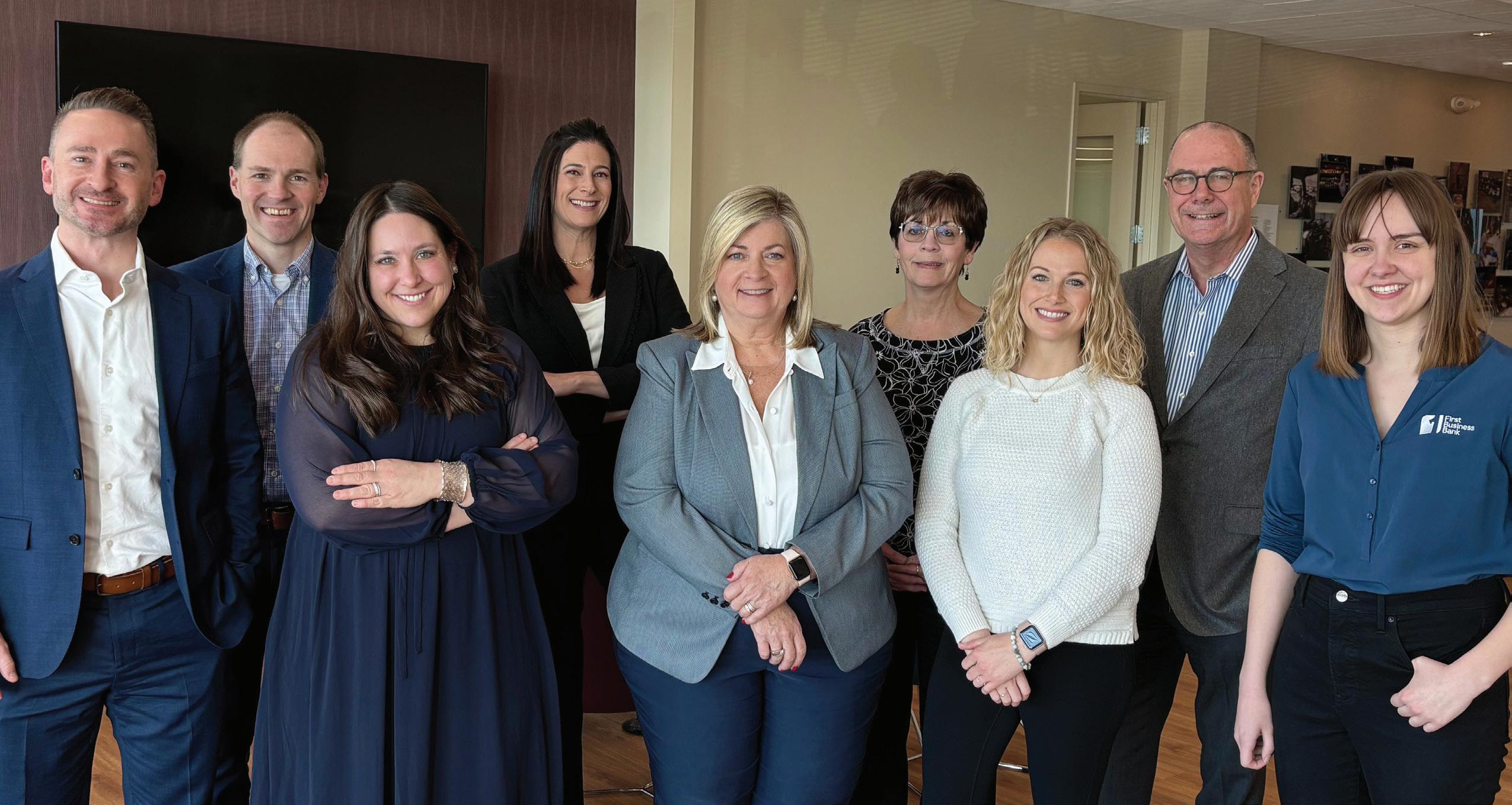
Ever wonder if your business’s cash reserves could generate significantly higher returns? As interest rates fluctuate, southeastern Wisconsin businesses are noticing how outdated liquidity practices can leave substantial money on the table.
The difference between passive and strategic liquidity management is key to positioning for growth during economic uncertainty.
How can cash segmentation strengthen your position?
Business leaders sometimes miss potential gains by treating all cash the same. Strategic segmentation creates distinct categories that serve different purposes while optimizing returns.
• Operating cash remains accessible for daily transactions while earning competitive returns.
• Strategic reserves support planned investments and growth initiatives.
• Safety cushions stay protected yet productive during market fluctuations.
The right deposit strategies help maintain flexibility while putting your money to work through a banking partner who understands your needs.
Modern deposit strategies that drive financial performance
Effective deposit strategies actively strengthen your financial position. Here are approaches our treasury management experts often customize for clients.
1. Establishing tiered deposit accounts that match specific business needs and access requirements.
2. Leveraging sweep services, including deposit insurance options that automatically optimize idle funds overnight.
3. Creating structured deposit programs that maintain liquidity while maximizing returns.
These approaches ensure your capital works efficiently while remaining accessible when needed.
Is your bank helping you make money on your liquidity?
While many banks focus primarily on loans, the best business banking relationships involve proactive consultation with treasury management experts who understand your business. Our Brookfield-based team, one of the largest in southeastern Wisconsin, works with local business leaders daily to develop customized liquidity frameworks other banks don’t prioritize.
We help them find a balance between safety, access, and returns, turning cash management into a competitive advantage while also helping them to prevent fraud. Unlike institutions that view deposits as merely funding loan portfolios, we see your liquidity as an opportunity for you to strengthen your financial position.
Ready to optimize your liquidity strategy? First Business Bank’s Treasury Management team is here to help. Member FDIC.
Anderson, BMO: “Businesses in Wisconsin are resilient having been through many cycles previously. We have seen some projects get deferred due to the tariff noise and fresh geopolitical risk. Labor seems to be hanging in there in Wisconsin and many of our clients have figured out how to navigate the current business environment by being committed to their strategic plan.”
Adam Newman, Landmark Credit Union: “Revenues and sales opportunities are up since COVID, but they plateaued recently. The national and international manufacturers are willing to wait for more economic certainty, which appears to be holding back growth in the short term. This pause is impacting new leasing and industrial construction as well. More certainty on construction costs and tariffs will obviously play a role in companies deciding to move forward.”
Brian Grossman, managing director, region manager – Wisconsin, JPMorgan Chase: “Many business leaders nationally and within Wisconsin are choosing to delay plans to some extent, as they wait for more clarity around key policies and keep an eye on uncertain economic conditions.”
ARE THERE ANY PARTICULAR SECTORS IN YOUR PORTFOLIO THAT ARE
Phillip Trier, EVP, head of corporate and commercial banking, Associated Bank: “Overall, we remain comfortable with our portfolio and remain committed to helping our clients grow. Our loan pipeline is at a record high, reflecting our clients’ desire to grow and invest.”
Slocum, Bank of America: “Businesses within the data center supply chain have certainly seen an increase in demand over the recent past, and they continue to share a strong growth outlook going forward.”
Kellman, North Shore Bank: “Service sectors continue to perform well. The trucking industry is underperforming due to weak freight demand.”
Laszewski, Waukesha State Bank: “The runup in construction costs is concerning in every sector and while many businesses would like more space, they are reshuffling and reconfiguring to put off the large investment. No particular sectors are either outperforming or underperforming.”
Mack, Town Bank: “Commercial construction firms, general contractors and sub-contractors continue to perform well. Multifamily and industrial real estate development projects are also performing well but there are concerns of an oversupply in some submarkets. Office remains
THE TALENT ISSUE
Success at every career stage
September 8 Issue
Space reservation: August 20

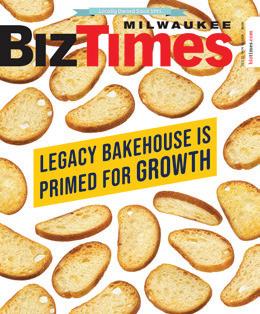
Talented, engaged employees are every business’s greatest asset. In the Southeastern Wisconsin economy, forward-thinking businesses nurture that talent at every stage.
This special issue includes chapters on :
• Career Ready-Workforce & Technical Education
• Talent Development
• Leadership
Thought Leadership pages: Talent attraction and development
“
While many businesses would like more space, they are reshuffling and reconfiguring to put off the large investment.”
— Tony Laszewski
the biggest challenge.”
Anderson, BMO: “Consumer discretionary has been stressed the past few years, since the boon days of COVID.”
Popp, Johnson Financial Group: “Our commercial real estate portfolio – in particular, our multifamily and industrial properties – continues to perform well despite the market dynamics. Commercial businesses with an outsized reliance on foreign raw materials, particularly from Chi-
Continued on page 36
THE SUCCESSION ISSUE
Keeping the success in succession
October 20 Issue
Space reservation: October 1


When it’s time to move on from your current business accomplishments to the next chapter, maintaining the results of that hard work for employees, clients and colleagues is key.
This special issue includes chapters on :
• Wealth Management & Retirement
• Business Valuation and Transition
Thought Leadership pages: ESOP Essentials Q&A and Wealth Management Q&A
Don’t miss this opportunity to share your expertise with companies throughout southeastern Wisconsin as they deal with
Reach your audience where they are Contact Linda Crawford or your account executive at advertise@ biztimes.com today!





Turn your what-ifs into can-dos with Summit’s business expertise:


• Ask any question. We know how to help, as Wisconsin’s #1 Small Business Lender.*
• Meet any goal! Our competitive business loan options make it easier.
• Get business-specific products and services to spend and save most efficiently.
• Ease the daily hustle with anytime banking and cash flow services.

• Take confident next steps with support from our business development team.

na, are obviously feeling a bit more tariff-related pressure.”
Newman, Landmark Credit Union: “All areas of our portfolio are performing well. Loans repricing at higher rates are still achieving acceptable cash flow due to increased rents and high occupancy levels. We have some exposure to office properties, but many are medical or corporate headquarters which have seen less vacancy issues.”
WHAT’S DIFFERENT IN YOUR CONVERSATIONS WITH BUSINESS OWNERS AND LEADERS COMPARED TO THE START OF THE YEAR AND THIS TIME LAST YEAR?
Trier, Associated Bank: “Earlier in the year we were having regular conversations regarding trade, tariffs, inflation, supply chain, etc. Those topics have become less common as clients have more certainty about the direction of the administration and the economy.”
Hermann, PNC Bank: “The broader economic and geopolitical landscape has gotten more volatile. As a result, we are counseling many more business leaders on how to best manage through the evolving landscape and help them best position their companies for growth. This has gen-
erally meant we have had more discussions on increased liquidity options and enhancing supply chain durability.”
Kellman, North Shore Bank: “There’s more focus on cost control, managing rates, and longterm planning. Compared to last year, optimism is more tempered, but business owners are better prepared and more proactive.”
Mack, Town Bank: “Most are still bullish and believe when clarity returns to the market as it relates to inflation, interest rates, tariffs, etc. they are ready to go with new projects.”
Anderson, BMO: “The pace and unpredictability of the change is different this year than last. The markets reward consistency: when nothing is consistent, planning becomes nearly impossible. Many of our clients are taking a ‘wait-and-see’ attitude towards major decisions.”
Popp, Johnson Financial Group: “This time last year it was all about the election and what might happen. At the start of the year, the election was over, so the conversation turned to speculation about what changes the new administration might make to policy, regulation, tariffs, etc. Today, it’s about trying to make the best possible long-term decisions – both personally and for the company – amid the uncertainty of the present.”





Most are still bullish and believe when clarity returns to the market as it relates to inflation, interest rates, tariffs, etc. they are ready to go with new projects.”
— Jay Mack “
Grossman, JPMorgan: “Wisconsin business leaders seem particularly cautious about the national and global economies but express more confidence in the local economy. While recession fears have increased since the start of the year, the majority of Wisconsin leaders do not see us entering a recession in 2025. Even against this uncertain backdrop, middle market businesses are showing their resilience.” ■













Tuesday, October 7, 2025 Brookfield Conference Center
12:30 PM – Registration, Exhibitor Booths, Networking









1:00-2:00 PM – 6 Concurrent Strategy Sessions
2:00-2:30 PM – Networking
2:30-4:00 PM – Main Panel Discussion









4:00-5:00 PM – 6 Concurrent Strategy Sessions




In today’s unpredictable economy, manufacturers must act decisively to stay competitive. Join us at the BizTimes Manufacturing Summit and walk away with insights into how industry leaders are taking control of what they can, investing for long-term gains and turning challenges into opportunities.
5:00-6:30 PM – Networking Reception
Discussions will address topics such as:
• Supply chain resilience and reshoring
• Navigating Disruptions
• Workforce strategy and leadership agility
• Building strong cultures
Confirmed Speakers:
• Micaela Bomhack, President & CEO, Rite Hite
• Jag Reddy, President & CEO, Mayville Engineering Corp.
• Jake van der Kooy, CEO, Benz Metal Products
PARTNER: BUSINESS STRATEGY SPONSORS:
SPONSORS:











JAY MACK
President & CEO, Town Bank, N.A. Wintrust Wisconsin Market Head jmack@wintrust.com 262-369-8800
GLENN MARGRAFF
Executive Vice President Wintrust Commercial Banking at Town Bank, N.A. gmargraff@wintrust.com 414-255-1002
BILL STONE
Executive Vice President Wintrust Commercial Banking at Town Bank, N.A. wstone@wintrust.com 262-369-8833
BRENT HAMM
Division Manager Wintrust Commercial Banking at Town Bank, N.A. bhamm@wintrust.com 414-255-1038
COURTNEY BRODERICK Vice President Treasury Management cbroderick@wintrust.com 414-255-1013
LAVERNE DAVIS Vice President Business Development Officer ldavis@townbank.us 414-273-3748
WELCOME TO BIZTIMES MEDIA’S BUSINESS CARES SERIES ON DIVERSITY IN BUSINESS. Diverse workplaces and work teams are more innovative, creative and better for the bottom line. We thank the nine companies and organizations listed below for sponsoring this important section. Their investment reflects the engagement and intention these organizations place on utilizing all of our region’s talent to grow their business and our economy. Their support also funds awareness efforts for the next month via print, digital and e-newsletter platforms. We hope you’ll support them as they join us in working toward a stronger Milwaukee and southeastern Wisconsin region for people from all backgrounds.

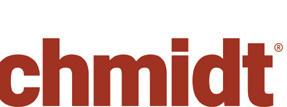






















BROOKFIELD CONFERENCE CENTER
7:30-8:00 AM – Networking & Breakfast
8:00-10:00 AM – Welcome & Program
10:20-12:00 PM – Breakout Sessions
Join us on August 21st for this half-day symposium filled with actionable insights to apply in your own life and career. Hear a panel of women from a range of industries discuss their journeys, attend breakout sessions to go deeper on important topics, network with women from across the southeastern Wisconsin business community and join in celebrating the 2025 Woman Executive of the Year.
Keynote Speaker:
» Becky Frankiewicz, President & Chief Strategy Officer, ManpowerGroup (2) Panelists:
» Roberta Brehm, President, Vyron (3)
» Jessie Cannizzaro, Owner/Master Plumber, Milestone Plumbing (4)
» Becky Frankiewicz, President & Chief Strategy Officer, ManpowerGroup
» Tami Martin, Director of Workforce Development, Froedtert Health (5) Moderator:
» Portia Young, Director of Corporate Public Relations, Sargento; Host, Milwaukee PBS (6)
Following the main session, please stay for breakout sessions on topics including:
» The Power of No: Boundaries, Balance, and Bold Decisions
» Courage to Lead Differently: Redefining Leadership for a New Era
» Doing Hard Things: Leading Through Life’s Toughest Moments
» How Can I Help? Tapping Into Your Network
» Negotiating with Confidence and Clarity
» AI 201: Integrating Artificial and Human Intelligence for Purposeful Work
» Aliah Berman
» Lena DeLaet
» Melanie Eden
» Yolonda Evans
» Jessica Jallings Gomez
» Bev Greenberg
» Genene Hibbler
» Phyllis King
» Stephanie Krubsack
» Erin Levzow
» Sarah Maio
» Susan Marshall
» Maredithe Meyer
» Kimberley Noble
» Nicole Pulito
» Lori Richards
» Beth Ridley
» Lacey Sadoff
» Rosario SanchezLedesma
» Anne Schwartz
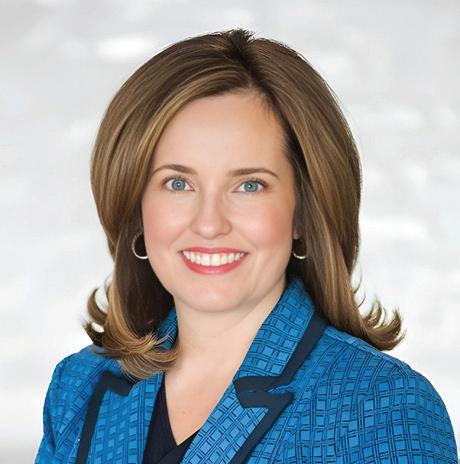

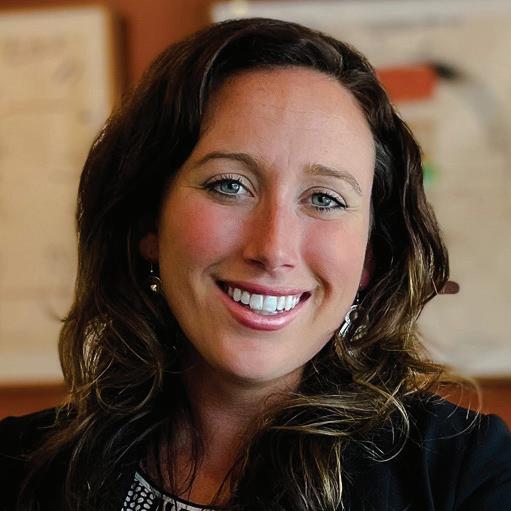
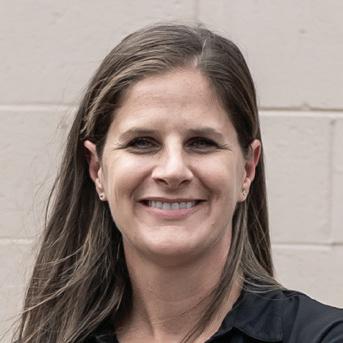
» Ashley Smart
» Marilyn Thiet
» Tiffany Wynn
» Sandy Wysocki
» Portia Young
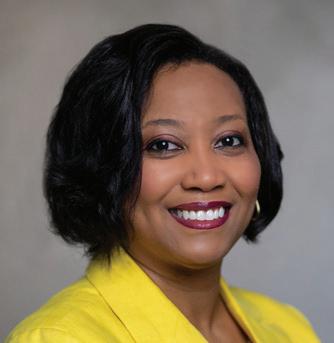





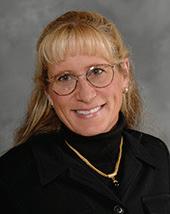

Despite political pushback, experts say DEI initiatives are good for business
BY ASHLEY SMART, staff writer
AS PRESIDENT DONALD TRUMP aims to end diversity, equity and inclusion initiatives at the federal government level and several major companies have announced rollbacks of their DEI policies recently, experts say there is still a strong business case for employers to continue their efforts.
“There was some backlash when DEI initiatives were put into place,” said Margaret Hughes-Morgan, Ph.D., associate professor of management at Marquette University. “That (backlash) quickly went away because, at the time, it was considered the right thing to do. Over time, empirical results have proven that it is the right thing to do.”
A Reuters poll released in January 2025 showed that 44% of respondents supported Trump’s goals of closing all federal DEI offices and firing all federal employees working on DEI initiatives.
Despite some doubts from the workforce, DEI initiatives continue to drive strong business outcomes, according to Hughes-Morgan.
In her research, she’s found that DEI initiatives account for a nearly 30% decrease in turnover rate, which is one of the biggest expenses incurred by companies.
Companies that do away with their DEI initiatives could also have problems down the road finding future leaders.
“Where will future leaders come from? The people you hire today. If you do away with DEI and the leadership of the future, it could have a negative impact on stock returns,” said Hughes-Morgan.
Motorcycle brand Harley-Davidson, based in Milwaukee, announced last September it had revised some of its employee training and corporate partnership policies related to DEI.
The company said the revisions were due to an internal stakeholder review launched at the start of 2024.
Harley’s policies also drew the attention of online conservative activist Robby Starbuck, who launched a campaign in July 2024 aimed at “exposing” the brand.
The company argued it had not operated a “DEI function” since April of 2024 and that it did not have hiring quotas or supplier diversity spending goals.
Harley also said that in the future, all business employee resource groups will have executive management to ensure each group is solely focused on professional development, networking and mentoring.
Hughes-Morgan believes the cost of running DEI-related programming could be part of the reason for Harley-Davidson’s decision.
“Companies don’t see the capital inflows until several quarters down the road, so it gives them an excuse to not invest in these types of initiatives,” she said. “Social media is also out there saying it’s a terrible thing to do, so it gives them kind of a cover.”
Rolling back DEI policies can signal to investors that a company is closely examining how
to spend its existing capital wisely, explained Hughes-Morgan.
Not having to allocate capital to DEI efforts can improve certain figures like a company’s return on assets.
The long-term impact of Harley-Davidson’s new policies remains to be seen. In May, the company said first quarter revenue was down 23% but cited economic uncertainty due to tariffs.
Another large national brand, Minneapolis-based Target, announced in January that it was ending its DEI initiatives.
The company reported a 2.8% decrease in earnings in the first quarter of 2025. A recent Fortune report also found that Target’s foot traffic has continually fallen over the past four months.
The Metropolitan Milwaukee Association of Commerce’s Region of Choice initiative, launched in 2019, aims to bolster the recruitment, training and advancement of Black and brown employees.
More than 130 employers in the region joined the initiative, working toward a collective five-year goal of increasing overall Black and brown employment by 15% and increasing Black and brown representation among management-level employees by 25%. Through 2021, ROC companies had 12.3% growth in Black and brown talent and 26% growth in Black and Brown management. The Region of Choice program, in its original form, ran through 2023; MMAC is currently working on its next iteration, to be announced in the coming months.
MMAC leadership said employers’ commitment to the cause is unwavering.
“Many ROC participants continue to pursue inclusive talent strategies, recognizing that diverse workplaces are essential to attracting top talent,” MMAC told BizTimes in a statement. “In light of the current climate, some companies have adapted their language or messaging to reflect their values in ways that resonate more broadly.”
These adjustments are being made for clarity and alignment and are not about companies stepping back from inclusion, according to MMAC.
The organization said its members have shared stories of “improved employee engagement, deeper pipelines and greater internal awareness” since joining the ROC initiative.
Local leadership expert and workplace culture consultant Beth Ridley said her clients are also standing firm in their beliefs on inclusion.
Most companies have concluded that they cannot build their workforce around one type of person, Ridley explained.
“Now that these employees are here, how do we keep them highly engaged and continue to have a strong pipeline of the best talent?” said Ridley. “These are fundamental, evergreen values that none of my clients are abandoning.” ■



Congratulations to the 2025 Future 50 award winners! We are thrilled to recognize these companies, the fastestgrowing privately owned businesses in southeastern Wisconsin. They have demonstrated remarkable achievements, exhibiting substantial revenue and employment growth over the past three years. Hear from the Fast 5—the 5 fastest growing companies in the area—about the challenges and opportunities they faced along the way.
We invite you to join us in celebrating their remarkable accomplishments at the awards luncheon on September 19.
American Construction Services
AMI Information Systems
Anderson Process
AO HANDY INC
Austin Plumbing, Heating, Air & Electric
Basic Metals, Inc.
Benz Metal Products, Inc.
Best Version Media
Briohn Building Corporation
Campbell Construction JC, Inc.
Capri Communities
Carrus Group
Catalyst Exhibits Inc
CJ & Associates, Inc
Craft Beverage Warehouse LLC
Edge Electric of WI, Inc
Ellenbecker Investment Group
Empower Electric
Evans Transportation
G10 Fulfillment
Harmoniq Residential
Innovative Signs, Inc
Inpro Corporation
Ixonia Bank
James Imaging Systems
Koru Health LLC
Lauber Business Partners, Inc.
Magellan Promotions
Midwest Construction Group LLC
Midwest Insurance Group
Moore Construction Services
Munson, Inc
New Resources Consulting
NEWaukee
Oarsman Capital, Inc.
Optimum Crush, Inc.
PACE Equity
Palermo Villa Inc. dba Palermo’s Pizza
Ready Rebound
RJ Schinner
Robertson Ryan Insurance
Sellars Absorbent Materials
SharkCrates
Shoreside Therapies
Stamm Technologies / Stamm Media
TEKLYNX Americas
The Prestwick Companies
Vizance
Walker Media Agency
Wolter, Inc.




BizTimes Milwaukee is proud to present its inaugural showcase of Notable Latino Leaders, recognizing accomplished professionals who are making an impact and leading the way in their organizations and the community. The individuals on the following pages were nominated by their peers and highlight the talent in the region.
METHODOLOGY: The honorees did not pay to be included. Their profiles were drawn from nomination materials. This list features only individuals for whom nominations were submitted and accepted after a review by our editorial team. To qualify for the list, nominees must be employed in the southeastern Wisconsin area, serve in a senior-level role in their organization, participate in professional organizations and/or civic or community service initiatives and have made significant contributions to advancing equity and inclusion in the workplace and/or in southeastern Wisconsin.

AMANDA SALAZAR DIRECTOR OF OPERATIONS AND VISITOR EXPERIENCE
BOOKWORM GARDENS
As director of operations at Bookworm Gardens, a nonprofit botanic garden in Sheboygan, Amanda Salazar focuses on developing long-term operational strategies and collaborating with the leadership team and board of directors. She is also in charge of the visitor experience, with front gate, programming and event staff all reporting to her.
Prior to taking her role at Bookworm Gardens in 2021, Salazar served as the manager of earned revenue and mission advancement at the John Michael Kohler Arts Center in Sheboygan.
Among several honors she’s received over the years, Salazar was named one of Wisconsin’s 36 Most Influential Latino Leaders by Madison 365 in 2024.
A passionate advocate for community development, Salazar is the founder of Sheboygan SOUP (Support Our Urban Projects) and co-founder of Active8 Sheboygan, where she currently serves on the board of directors.
“Her expertise in innovation leadership and change management supports the growth and sustainability of community initiatives,” according to Elizabeth Wieland, executive director of Bookworm Gardens.
SANDRA DEMPSEY CEO AND EXECUTIVE PRODUCER
SOURCE TEN
Sandra Dempsey founded Milwaukee-based video production company Source TEN in 2019 after leaving a job at a Spanish-language television station and seeing a market for Spanish speakers in the Milwaukee area that were often missed by advertisers and other content creators. The company works with businesses, organizations and nonprofits to create videos for product marketing, corporate videos and TV commercials, among others.
Dempsey in 2018 also launched Estamos Unidos US, a Spanish multiplatform production, to share insights on health and wellness and personal growth with the Latino community.
“She is a tireless advocate and promoter of all things Latino in the greater Milwaukee Hispanic community and has touched thousands of lives in very tangible ways. Sandra and Source TEN have beautifully told the stories of the Hispanic community, including award-winning video productions,” said Mark Boyce, director of communications and development at Source TEN.
Dempsey has served on the boards of several community organizations, including the Milwaukee Ballet from 2021 to 2023 and Casa de Esperanza from 2014 to 2021. She has served on the board of Catholic Financial Life since 2019.

MARCELIA NICHOLSON CHAIRWOMAN MILWAUKEE
COUNTY BOARD OF SUPERVISORS
As the chairwoman of the Milwaukee County Board of Supervisors, Marcelia Nicholson is the first Black Latina to hold this role.
Marcelia Nicholson was elected to the Milwaukee County Board of Supervisors in 2016, becoming vice chair in 2018 and chairwoman in 2020.
Nicholson’s career is rooted in public service, beginning as a Milwaukee Public Schools teacher, where she championed education equity and opportunities for underrepresented communities in the city’s poorest zip codes, according to Aerial Lopez, constituent services specialist for Milwaukee County.
“Her tenure as chairwoman has been marked by a strong focus on addressing racial and economic disparities in Milwaukee County. She has led initiatives to expand affordable housing, enhance public transportation, and improve mental health services. Her leadership has been instrumental in advancing the county’s efforts toward achieving racial equity and climate sustainability,” said Lopez.
Now in her third term as chair, Marcelia also serves on the boards of the Milwaukee Public Museum, Wisconsin Counties Association, Clean Wisconsin and Hispanic Professionals of Greater Milwaukee.

PRESIDENT AND CHIEF POSSIBILITIES OFFICER HPGM
HPGM (Hispanic Professionals of Greater Milwaukee) membership has nearly doubled in the past four years under the leadership of Francesca Mayca Wegner, president and chief possibilities officer.
Since joining HPGM in 2021, Wegner has helped secure the largest grant in the organization’s history and co-founded the Poderosa Collective, an alliance that aims to unite, elevate and highlight Latina voices in order to grow their social and economic power. She is also the founding director of Techqueria’s Milwaukee chapter.
“A movement leader who dreams big and envisions the abundant possibilities around her, Francesca Mayca Wegner has dedicated her life to helping others stand in their power,” said Lindsey Kriete, managing director at Spano Pratt Executive Search.
“She is an advocate, connector and convener, and has led the organization through a record growth period with its membership and philanthropic gifts during some of the most challenging times. Francesca earned both her bachelor’s in business administration and MBA from Marquette University, and in June 2022 she was selected by the Greater Milwaukee Committee to represent Milwaukee at the Harvard Business School Young American Leaders Program.
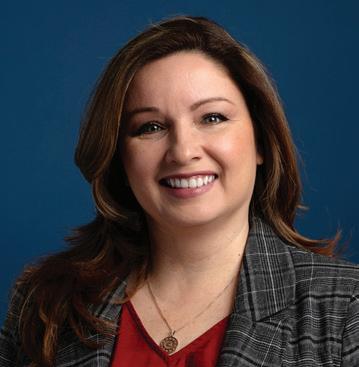
MARILYN JONES
DIRECTOR OF THE LEMONIS CENTER FOR STUDENT SUCCESS
MARQUETTE UNIVERSITY
As the inaugural director of the Lemonis Center for Student Success, Marilyn Jones leads Marquette University’s central hub for wraparound services for students across all majors, academic abilities and backgrounds.
Consisting of seven anchor programs, the Lemonis Center is core to Marquette’s Student Success Initiative, providing support through academic coaching and tutoring, career guidance and programming that promotes a sense of belonging.
“Marilyn Jones is the heart of the Lemonis Center for Student Success,” said Erik Albinson, director of Marquette’s Academic Resource Center. “She leads with care, attention to detail and an unwavering warmth that permeates all that she does.”
More than 8,300 unique visitors used the center’s services in its first academic year, including a 46% increase in resume reviews, a 26% increase in tutoring usage and a 22% increase in academic coaching sessions.
“She has very quickly built a community that supports the success of all students at Marquette,” said Courtney Hanson, director of Marquette’s Career Center.
Jones has also established the Campus Partner Spotlight Series and Student Success Dialogues.
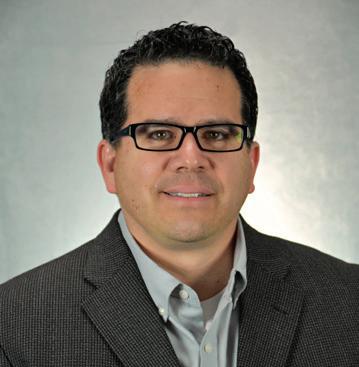
STEVE FLORES GENERAL SUPERINTENDENT AND FIELD PERSONNEL COORDINATOR
CG SCHMIDT
Colleagues say Steve Flores, general superintendent and field personnel coordinator at Milwaukeebased construction firm CG Schmidt, is an advocate, mentor and role model within the Hispanic community and beyond.
“With a career rooted in the trades, Steve has made it his mission to uplift the next generation of builders, particularly those who haven’t had a traditional path or easy start in life,” said Beth Blanck, director of marketing for CG Schmidt. “He is a tireless champion for youth, actively mentoring through CG Schmidt’s youth apprentice program and serving as a steady, encouraging presence for those considering careers in construction.”
Flores has been with CG Schmidt for 25 years. With the youth apprentice program, he works on-site at high schools across southeastern Wisconsin, talking to students about careers in construction. The program signed its first apprentice in 2022.
Flores joined the WRTP | Big Step Racine advisory board in 2020. WRTP focuses on skilled trades apprenticeship readiness and passion projects in partnership with industry leaders, the community and schools.



René Howard-Páez, president of St. Joan Antida High School, is the youngest Catholic high school president in Milwaukee – and the only Latino male in such a role.
“It’s been a privilege to witness René Howard-Páez step into his role as president with both bold vision and grounded leadership,” said Karina Valdes-Garcia, admissions coordinator at Marquette University. “René is breaking barriers while staying connected to the heart of the community.”
Since joining St. Joan Antida in July 2024, Howard-Páez has led a large capital project and has helped the school continue to grow enrollment and expand its career pathway programs.
Howard-Páez previously served as a field talent growth and development strategist at Northwestern Mutual, where he spearheaded new campus engagement strategies. Before that, he was the director of diversity and inclusion at Marquette University High School and the founding director of admissions at Cristo Rey Jesuit High School in Milwaukee.
“What makes René truly stand out is his leadership style, one rooted in presence, humility and relationships. He listens closely to students, builds trust with families and engages donors and community partners with honesty and purpose,” Valdes-Garcia said.




VICTOR AMAYA
PRESIDENT AND EXECUTIVE DIRECTOR
DATA YOU CAN USE
As president and executive director of Milwaukee-based Data You Can Use, Victor Amaya, Ph.D., supports initiatives that bring critical information to underserved neighborhoods, according to Oscar Mirele, founder and executive director of Latinos Organizing for Understanding and Development.
Since taking the helm of DYCU in 2021, Amaya has led the organization to increase revenue by 140% and expand its reach through projects like Neighborhood Data Portraits and the Milwaukee Indicators initiative, “tools that equip Milwaukeeans – especially underserved residents of color – with accessible insights on housing, education and health,” said Amanda Aliperta, founder and principal of Momentum Nonprofit Strategies.
Amaya also mentors emerging leaders of color and students through Public Allies Milwaukee, UWM Zilber School of Public Health and Marquette University’s Trinity Fellows Program. Amaya mentored now-Mayor Cavalier Johnson while he was in high school and gave him the nickname “Chevy” when he first met him as a 14-year-old student.
Amaya also serves as board president at Southside Organizing Center and Your Move MKE, and as a board director at MKE Tech Hub and founding director of Techqueria’s Milwaukee chapter.



Priscilla Prado, founder and CEO of Milwaukee-based Midwest Bookkeeping & Solutions, was elected to the Wisconsin State Assembly in November 2024 and began her term in January 2025.
Prior to her public service, she worked in accounting and financial services for more than two decades, launching Midwest Bookkeeping in 2019.
“(Prado has) built a bilingual enterprise that serves underserved small businesses and families,” said legislative assistant Brooke Smith.
As a state representative for Milwaukee’s south side, Prado currently serves on the Commerce, State and Federal Regulations, and Information Technology and Policy committees. In 2025, she was appointed vice chair of the Business, Economic Development, International Relations and Trade Task Force for the National Hispanic Caucus of State Legislators. Also this year, she joined the Governor’s Council for Migrant Workers.
Beyond her legislative roles, Prado lends her voice to cardiovascular health awareness. In May 2025, she was the featured survivor speaker at the American Heart Association’s Milwaukee Go Red for Women Luncheon, sharing her personal story of surviving two heart attacks and a triple bypass and urging women to prioritize heart health.
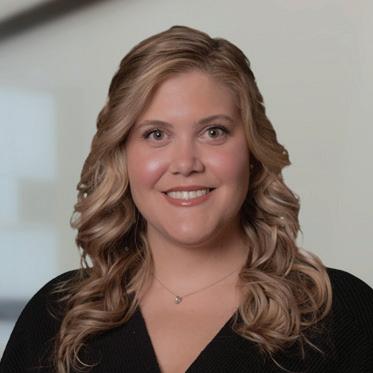
VON BRIESEN & ROPER S.C.
Alexandra Appenzeller, shareholder at Milwaukee-based von Briesen & Roper s.c., has nearly a decade of experience representing clients in the commercial real estate industry and has established herself as an “exceptional connector and catalyst for industry growth,” according to her husband, Steven Appenzeller, corporate treasury financial analyst for Johnson Financial Group.
Appenzeller is a graduate of LISC Milwaukee’s Associates in Commercial Real Estate program, where she remains involved through regular volunteer speaking engagements, sharing expertise with emerging professionals.
She has continued to hone her leadership by participating in NAIOP’s Developing Leaders All Star Program for the past five years and graduating from CARW’s NextGen Program in 2019. She has also earned recognition as a Notable Women in Law in 2022 and CARW Champion in 2020.
“Her ACRE graduation in 2020 was marked by her team achieving the evening’s highest capstone project score,” said Alissa Peeters, vice president at Tri City National Bank. “Most significantly, she works tirelessly to integrate all individuals into Milwaukee’s real estate community, providing essential tools and relationships for their success.”

VC 414
Raquel Filmanowicz launched Milwaukee-based venture capital firm VC 414 in 2023 with managing partner Jennifer Abele to help underrepresented founders grow their businesses. The firm backs early-stage, high-potential startups and currently has a 16-company portfolio.
In her current role, Filmanowicz draws on her experience in finance, civic leadership and public health. She previously spent 11 years at BMO Harris Bank in roles involving corporate philanthropy, commercial banking and venture investment, including managing a national social impact fund investing in emerging venture and private equity and coordinating the bank’s philanthropic strategy.
Filmanowicz is the co-chair of the 2025-26 United Way Charitable Giving Campaign and serves on several other community boards, including the Children’s Wisconsin Foundation board.
“Her commitment to the Hispanic community goes back decades as she has mentored dozens of people and gained the respect of the national community,” said Mark Blutstein, CEO of Reliable Knitting Works.
Filmanowicz was also the CEO of the host committee for the 2020 Democratic National Convention, which took place in Milwaukee under a mostly virtual format due to the COVID-19 pandemic.

WILLIAM GRUVER DIRECTOR OF FINANCE UNITED COMMUNITY CENTER
As director of finance at the United Community Center in Milwaukee, William Gruver has guided the finance team through organizational growth, overseeing more than 40 public and private grants to support the organization’s financial stability
Gruver also oversees UCC’s homebuyer program, school meals program and Café El Sol restaurant.
“Since he stepped into the leadership role in 2024, the finance department has reduced accounts receivable cycle times and improved cash flow, critical achievements that directly support UCC’s ability to deliver high-quality programming in education, housing, elder care and health services,” said Laura Gutierrez, CEO of UCC.
“His collaborative approach has helped build a finance operation that not only ensures fiscal accountability but also enables innovation across departments. William’s team-centered mindset ensures UCC can meet community needs with excellence, even amid economic uncertainty.”
A native of Caracas, Venezuela, Gruver holds a bachelor’s degree in accounting from the Universidad Central de Venezuela and is currently pursuing an MBA in nonprofit management at Concordia University Wisconsin.

TONY SNELL RODRIGUEZ
DIRECTOR OF COMMUNITY ENGAGEMENT AND INCLUSION VISIT MILWAUKEE
As director of community engagement and inclusion at Visit Milwaukee, Tony Snell Rodriguez has redefined how a destination marketing organization can serve its community, according to Visit Milwaukee’s president and CEO Peggy Williams-Smith.
“His leadership has reshaped relationships, centered inclusion and ensured that Milwaukee’s story is told by and for everyone who calls it home,” Williams-Smith said.
In 2024, Rodriguez represented Visit Milwaukee at 90 community events across the region. He also spearheaded the organization’s sponsorship of nearly 70 events throughout the year.
Rodriguez grew up in South Carolina, where he co-founded the National Equality Federation and helped pass the City of Columbia Human Rights Ordinance — one of the first pieces of legislation of its kind in the South.
Here in Milwaukee, he has led volunteer operations for the 2020 Democratic National Convention, managed statewide coalition outreach for the Biden-Harris presidential campaign and launched Visit Milwaukee’s mobile visitor center.
He has served as chair of the City of Milwaukee Equal Rights Commission since 2016.

ARTURO VAZQUEZ DIRECTOR OF IT UNITED COMMUNITY CENTER
As director of IT at the United Community Center in Milwaukee, Arturo Vazquez leads a team that supports more than 550 employees across the agency.
“Arturo brings a strategic understanding of how effective IT systems and the people who manage them directly impact organizational productivity and the ability to deliver on UCC’s mission,” said Laura Gutierrez, CEO of UCC.
Under his direction, UCC has worked to strengthen its cybersecurity infrastructure, implementing new network protections, multi-factor authentication and regular risk assessments to safeguard data and systems across its education, health and social service programs.
Vazquez also led the implementation of an internal IT training program to ensure all staff are trained on mitigating various cybersecurity challenges.
While he has been in his current position for a bit more than three years, Vazquez has been at the UCC help desk for almost 25.
“Arturo fosters a culture of accountability, excellence and clarity, ensuring his team not only resolves technical issues but proactively empowers staff with the tools and knowledge to succeed,” Gutierrez said.

HINSHAW & CULBERTSON LLP
April Toy, partner at Hinshaw & Culbertson LLP in Milwaukee, focuses on commercial litigation, professional responsibility, including legal malpractice defense, and insurance coverage disputes.
“April is a skillful and accomplished litigator who has successfully represented clients in a series of complex high-value litigation and appellate matters, including trying numerous cases to a favorable verdict,” said Fernando Rivera-Maissonet, partner at Milwaukee-based Hinshaw & Culbertson. “The daughter of a Salvadoran immigrant, she has dedicated herself to mentoring Hispanic and Latino associates and law students.”
Toy sits on the boards of several organizations that are committed to serving the Hispanic and Latino communities and other underserved communities. She is the sitting National Secretary of the Hispanic National Bar Association and the vice chair of the National Leadership Council of the Hispanic Alliance for Career Enhancement.
She is also a founder of the Wisconsin LAWtinas group, an informal statewide community of Latina lawyers, legal professionals and law students that meets quarterly. The group works as a network of mentors and provides educational resources to members on a range of issues.

EDUCATION
MILWAUKEE
Josephine Gomez, Ph.D., has served as Milwaukee Area Technical College’s dean of community education and strategic engagement since December of 2024.
She oversees the college’s adult basic education courses and programs, which include English as a second language and English language learner classes as well as GED and HSED courses. She’s also in charge of the MATC Education Center at Walker’s Square.
“Dr. Gómez is quickly transforming the Community Education pathway into a collaborative, supportive and engaging work environment for our students, staff and faculty,” said Phillip King, MATC’s executive vice president and provost. “She has an incredible work ethic and very rigorous standards for assessment of learning and quality assurance.”
Before becoming dean, Gomez served as the director of the high school relations, transfers and articulation, and international education departments at MATC.
“As a Latina, she is very proud of her accomplishments in her career,” King said. “She also is grateful for the vital support she received from her extended family that helped her navigate the complex and diverse world of work.”


MARWILL SANTIAGO DIRECTOR OF STUDENT RECRUITMENT & CALL CENTER
MILWAUKEE
AREA TECHNICAL COLLEGE
Marwill Santiago took a job at Milwaukee Area Technical College in 2000 to help pay for college. He didn’t think he’d work there very long. A quarter century later, Santiago, who was born in Puerto Rico and grew up in Milwaukee, is still at MATC.
Today, he leads the college’s recruiting department. His department participates in college fairs, resource fairs and other events to promote the school. He also oversees the college’s call center, which handles hundreds of calls from current and prospective students every day.
“Marwill is the kind of leader who rolls up his sleeves and works alongside his team supporting them all the way,” said Tony Tagliavia, the college’s chief marketing officer. “He always finds a path to yes for system changes that support our students.”
Santiago has helped the college increase enrollment each of the past three academic years and helped grow the number of Hispanic and Latino students from 16% of its total students in 2018-19 to 23% in 2024-25, almost meeting the 25% needed to qualify MATC as a federally designated Hispanic-Serving Institution.
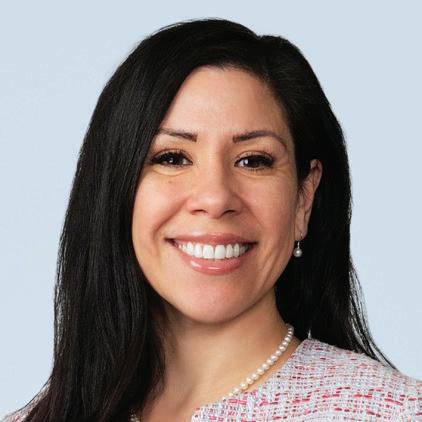

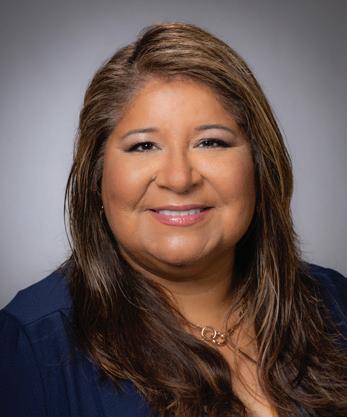


JUAN MIGUEL MARTINEZ
12TH DISTRICT SUPERVISOR
MILWAUKEE COUNTY
Juan Miguel Martinez, Milwaukee County Board Supervisor for the 12th District, is a lifelong Milwaukeean, graduate of Milwaukee Public Schools and is the son of Mexican immigrants.
He has an understanding of working-class struggles and a commitment to community service, according to Christa Beall Diefenbach, executive director of the Milwaukee Domes Alliance.
“An advocate of Milwaukee’s south side community, Martinez ran for the County Board of Supervisors to represent the voice of his community and to advocate for support that too often went to other districts,” said Diefenbach.
In 2024, Martinez helped secure a $30 million commitment from Milwaukee County in support of the revitalization effort for Mitchell Park and its horticultural conservatory.
He launched the “Friends of Mitchell Clarke” initiative to revitalize Mitchell Park and Clarke Square, organizing community events like Shakespeare in the Park and bilingual listening sessions at the Mitchell Park Domes.
Martinez started his career as an English teacher in Mexico City and went on to work in local foundries and tanneries. He has also written for publications including Urban Milwaukee, Milwaukee Record, Shepherd Express and El Conquistador.
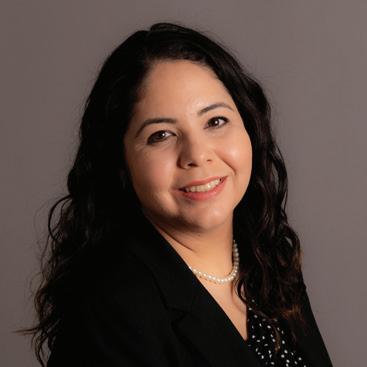
GABRIELA PARRA
PARTNER, CO-OWNER AND IMMIGRATION ATTORNEY
LAYDE & PARRA S.C.
Gabriela Parra, immigration attorney, partner and co-owner of West Allis-based Layde & Parra S.C., is a first-generation college graduate and among just 2% of attorneys in the U.S. who are Latina.
“Parra brings strategic acumen and deep compassion to her immigration practice, where she manages complex asylum and removal-defense cases,” said Gratzia Villarroel-Hurst, president of ElevareNova.
In April 2024, Parra co-organized Wisconsin’s inaugural State of Latino Education Summit, convening cross-sector leaders to address educational disparities. She also leads free monthly sessions for community partners serving immigrants, offering real-time legal updates and collaborative strategies. Currently, she is helping create a statewide legal defense fund to support asylum seekers in immigration court.
Parra mentors Latino students, emerging attorneys and Catholic women seeking spiritual leadership.
“Her impact reflects a career shaped by lived experience – from her upbringing in East Los Angeles to building trust as a bilingual community liaison in Wisconsin. Her work not only opens doors but ensures they remain open for future generations,” VillarroelHurst said. “She has been a transformative leader in law and community advocacy.”
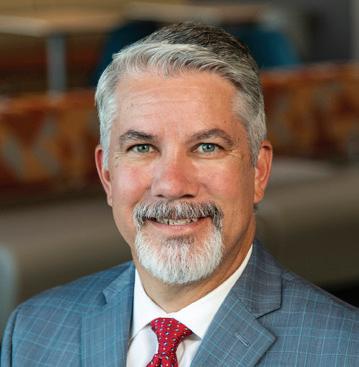
CARTHAGE COLLEGE
Jim Padilla, dean of the School of Business and Economics at Carthage College, co-directs the college’s new Spark program with Paul Martino, dean of the professional studies division. The program is designed to meet the needs of local companies in the MilwaukeeChicago corridor by providing college undergraduate and graduate classes on-site in “workplace-delivered education.”
In 2024, Padilla also started an undergraduate major in health care administration and a master of product development program at the college, located in Kenosha.
“Under Dean Padilla’s leadership, the master’s of sport management and the master’s in business development and innovation programs have doubled in size since 2022,” Martino said. “While he was the dean of the School of Business at Loras College in Dubuque, Iowa, Padilla significantly increased the size of the school.”
Padilla’s relationships with the Minnesota Wild, the Chicago Sky, the Chicago Fire and the Milwaukee Bucks have resulted in dozens of Carthage school of business and economics students getting internships and post-graduation employment. He also sits on several national nursing boards, said Martino.

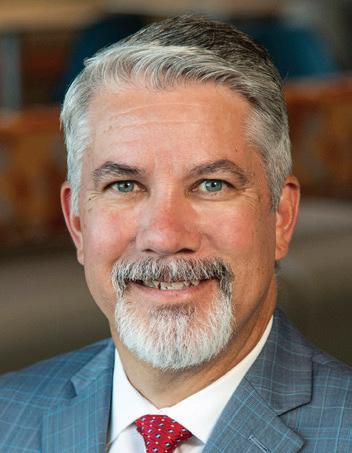
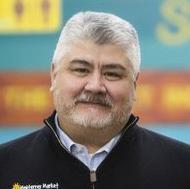
ROBERT MONTEMAYOR OWNER
MONTERREY MARKET
Robert Montemayor, owner of Monterrey Market, started with a small store on South 13th Street in Milwaukee in 2010. Now, the grocer has three locations in the city.
“It is a testament to his Hispanic heritage and dedication to serving the community. As a family-owned brick-and-mortar establishment, Monterrey Market captured the hearts of locals, becoming a beloved cornerstone of the neighborhood,” said Jorge Meraz, owner of Don Chamoy Ice Cream House. “Moreover, he understood the significance of supporting his country. He has two sons proudly serving in the Navy and Air Force.”
Montemayor opened a second Monterrey Market on South 27th Street in 2020. He opened his third location in June at 7025 W. Main St., taking over a former Walmart store building just east of Wisconsin State Fair Park.
He also is involved in a number of local organizations, including as president of the Crisol Corridor Business Improvement District and board member of the South 27th Street BID, the St. Josaphat Basilica Foundation and the Airport Gateway BID.
Montemayor is also a proud member of the American Indian Chamber of Commerce of Wisconsin and has a certification of appreciation from the Salvation Army.

CANTARERO
DEPUTY CITY ADMINISTRATOR
CITY OF WAUWATOSA
Melissa Cantarero Weiss, deputy city administrator for the City of Wauwatosa, has nearly two decades of experience in public sector strategic planning. In 2024, the City of Wauwatosa ranked in the top 10% of cities nationwide for resident satisfaction, according to ETC Institute.
In the past year, Weiss helped Wauwatosa’s Tourism Commission recruit artist Thomas Dambo to create a large-scale public sculpture in the city’s Firefly Grove Park.
“The installation of the Wauwatosa troll has elevated the city’s visibility on the international stage, spurred tourism and inspired widespread community pride,” said Eva Ennamorato, Wauwatosa communications manager. “This is evidence of Melissa’s ability to lead projects that blend creativity, strategy and long-term impact.”
Weiss also recently championed ART 64, a live bracket-style painting competition that has taken place annually the past four years, bringing together artists from across the country.
In addition to her professional work, Weiss contributes her time to community service initiatives such as Tosa Cares and the MacCanon Brown Homeless Sanctuary. She also supports events at St. Jude the Apostle parish.
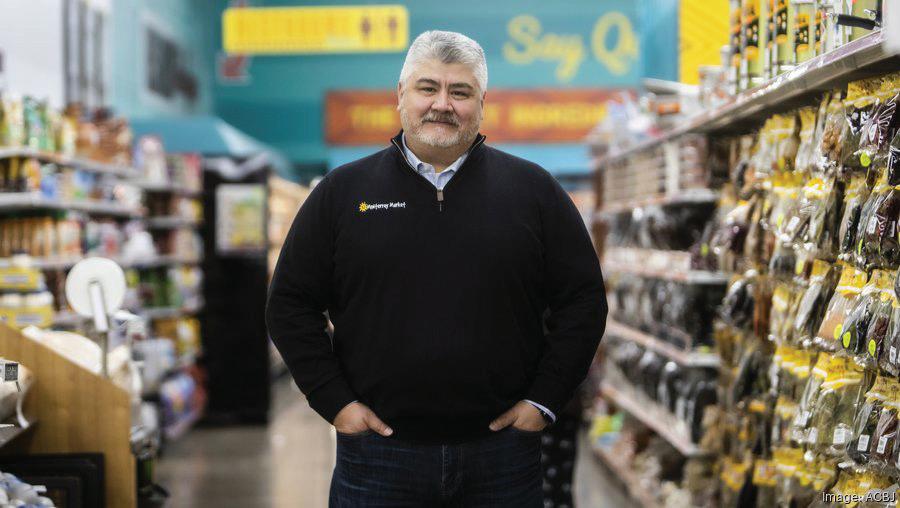
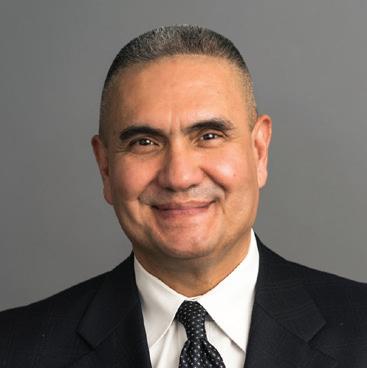
ALFREDO MARTIN ASSISTANT VICE PRESIDENT AND COMMUNITY ENGAGEMENT MANAGER NORTH SHORE BANK
Alfredo Martin led the effort in 2004 to open a North Shore Bank branch inside the El Rey Foodmart store on Milwaukee’s south side, the first bank in the state to open a branch inside a multicultural supermarket.
“Alfredo brings a deep understanding of community involvement and its power to drive opportunity and inclusion,” said Susan Doyle, senior vice president of retail banking at Brookfield-based North Shore Bank. “This initiative not only expanded access to essential banking services but also introduced culturally relevant financial literacy resources and programs to the area that has historically been underserved.”
In 2023, under Martin’s leadership, the branch moved into a larger, newly constructed space across the street from El Rey. Martin, who serves as assistant vice president and community engagement manager, also hosts weekly radio segments and bilingual financial seminars, hires talent from neighboring communities, and forms partnerships with organizations like the Latino Chamber of Commerce of Southeastern Wisconsin, where he previously served as board chair.
He recently participated in Racine’s Money Kids Program, bringing third graders information on how to manage, save and use their money.

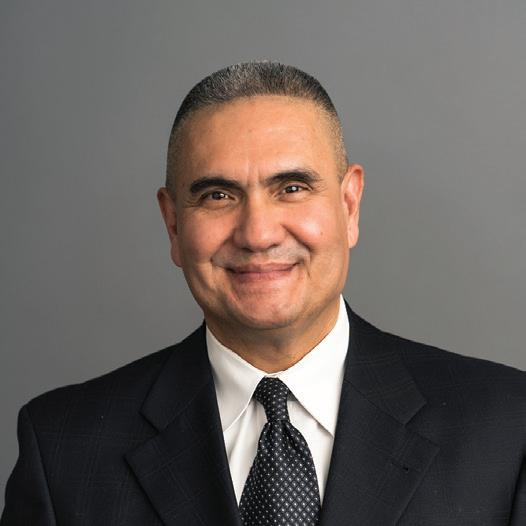

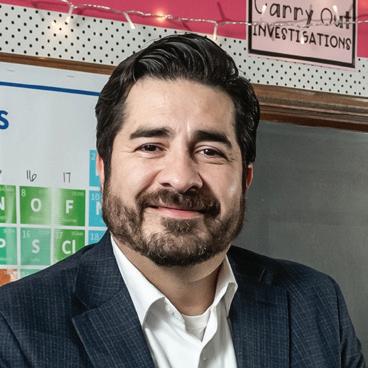
IVAN GAMBOA SENIOR VICE PRESIDENT TRI-CITY NATIONAL BANK
As senior vice president at Oak Creek-based Tri-City National Bank and board chair of Carmen Schools of Science & Technology, Ivan Gamboa’s impact as a professional, parent and community leader is expansive and remarkable, according to Aaron Lippman, CEO of Carmen Schools.
“He lives Carmen’s mission promise – ‘...prepared for success in college, a meaningful career, community involvement and family life,’” said Lippman.
Gamboa has served as Carmen’s board chair since 2011. He has also served on the boards of the Harbor District Business Improvement District (BID), the Cesar E. Chavez BID and the City of Milwaukee Plan Commission, and is the former chairman of the Wisconsin Housing & Economic Development Authority.
During Gamboa’s tenure on the board of Carmen, the organization grew to serve 10 times as many students and graduate more than 2,000. The local network of public charter schools will open a new $55 million facility next year on Milwaukee’s south side.
“He has mentored, connected and developed countless young people throughout their careers, as evidenced by Ivan’s deep relationships across the state in education, politics, finance and construction, to name a few,” said Lippman.
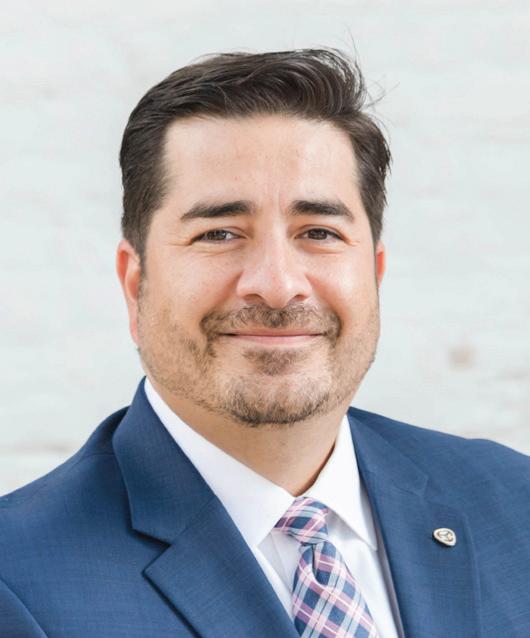

LUNA CO-FOUNDER
Since Jose Luna, co-founder of Milwaukee-based Luna Listings Real Estate became a licensed realtor in 2013, he has helped hundreds of families build wealth through homeownership, especially in historically underserved neighborhoods, according to his wife and business partner, Jennifer Luna, broker owner at Luna Listings.
“He plays a pivotal role in training and mentoring new agents, some of whom are Latino and/or first-generation professionals. His approach emphasizes ethics, excellence, and the importance of giving back,” said Jennifer Luna.
Jose Luna is a member of the Greater Milwaukee Association of Realtors, the Wisconsin Association of Realtors and the National Association of Realtors. He is on track to become a licensed broker in 2025.
Jose Luna has also volunteered his time to host bilingual homeownership workshops with area lenders, helping families understand the path to buying their first home. He also serves as an informal mentor to young entrepreneurs. He has been recognized by Zillow as a top agent multiple times and he has been featured on Telemundo Milwaukee.











IT’S 4 A.M. on a Monday morning, and Adam learns his father, the founder of the family business and public face of the business, has had a heart attack and is in intensive care.
As senior vice president of the company, Adam must now assume the role of president and oversee the business until his father recovers and again resumes the role of president. Upon arrival at the office, Adam enters his father’s office and finds the desk covered with invoices, correspondence and orders and doesn’t know where to start.
It’s clear this business lacks a disaster plan. To ensure continuity, Adam needs to quickly develop an interim plan, covering any leadership transitions during this period of uncertainty and how responsibilities are divided among the team.
I experienced a similar situation as senior vice president at a local manufacturing firm when the owner had a heart attack. The lack of a disaster plan during this period of uncertainty eventually led to a loss of sales, the downsizing of the company and the filing for bankruptcy a number of years after the owner’s untimely death.
A disaster plan should specify who will assume leadership roles, whether they be family members or senior managers. That morning, Adam should call a meeting to reassign tasks, with each leader subsequently delegating them within their teams.
The company must keep operating to maintain sales, market share and suppliers. A meeting should be held to inform employees that Adam will act as president until his father returns. Adam

should then contact key suppliers and customers to assure them the business will continue under his leadership during this period. If his father had specific expertise, that no one else had in the company, he may need to engage a consultant to perform these duties.
The first task for Adam is to tackle his father’s desk. Are there bills to be paid, orders to be signed, appointments to be kept? If so, he needs to get started right away. Remember when you call your customers and suppliers, the message you convey is critical, you need to stress that it will be “business as usual.” This same message should be communicated to the entire company. If your customers or suppliers sense that there is turmoil or uncertainty, this could directly impact your business.
Adam immediately assembles the senior management, and they draft out and implement a basic disaster plan. Over the next eight weeks they update the plan, and the business is on stable ground when his father returns to his desk, which was organized by Adam in his absence.
This plan is designed to assist management in navigating any interruption in the business. For example, the death of the owner/chairman or the loss of a major customer, supplier or a disruption in the supply chain. When this plan is activated, every member of the management team should know what their responsibilities are.
Our company did not have such a plan, which delayed our response to the loss of leadership. The other challenge we faced was that the elder son of our founder was not totally groomed to assume the role of chairman. The result was that each executive team member did not have clear instructions as to what additional responsibilities to assume. We were like a rudderless ship floundering in the ocean. Orders were cancelled, contractors would no longer produce our products, and we were on a cash basis with our suppliers. The end result of this turmoil was a bankruptcy and the
closing of the business.
You can prevent this outcome by developing a disaster plan for your business. It will pay dividends. You will sleep better knowing that you have a plan. You should revisit this plan annually to ensure it reflects the current responsibilities for each management team member.
As of 2024, approximately 54% of organizations have a documented, company-wide disaster recovery plan. These statistics indicate nearly half of all businesses may be unprepared for significant disruptions in their businesses caused by cyberattacks, natural disasters or other emergencies. It is critical for businesses to not only develop a comprehensive disaster plan, but also test and update them regularly.
Is your company prepared for a major disruption in your business? ■

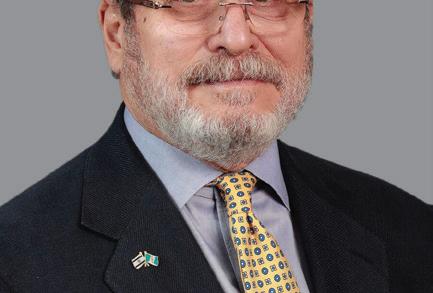
Cary Silverstein, MBA, author of the book “The Company Doctor Prescribes,” is a former executive for Gimbel’s Midwest and JH Collectibles, and a former professor for DeVry University’s Keller Graduate School. He can be reached at csilve1013@aol.com.
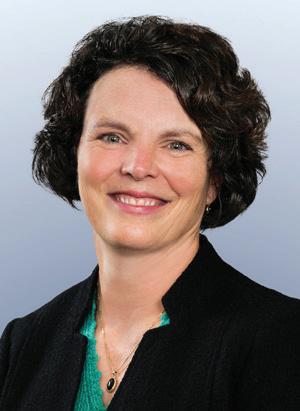
SVA Certified Public Accountants’ Kelly Blau Promoted to Principal
SVA Certified Public Accountants is pleased to announce the promotion of Kelly Blau to Principal.
Kelly has been with SVA for 24 years and co-leads the firm’s Manufacturing Industry Group. She specializes in financial statement audits, reviews, and compilations for clients in the manufacturing, construction, and professional services industries.
In addition to assurance services, Kelly advises business owners on improving internal controls and streamlining accounting procedures to increase operational efficiency. Her collaborative approach and deep industry knowledge have made her a trusted advisor to clients.





Waukesha State Bank Promotes Adam Kozicki to President of Payroll Complete
Waukesha State Bank is proud to announce the promotion of Kozicki to President of Payroll Complete, the Bank’s payroll services division. In his new role, Adam will provide strategic oversight for all aspects of the division.
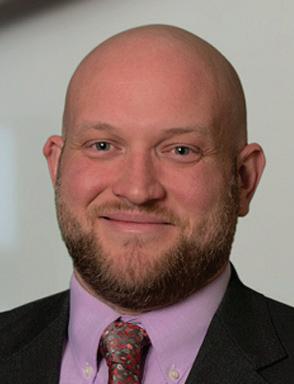
Logan Glasenapp joins von Briesen’s Environmental Section in its Milwaukee office
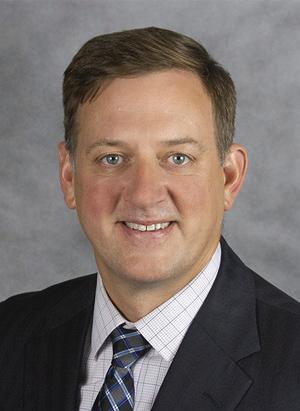
West Bend announces leadership realignment and Marc Emery promotion
West Bend Insurance Company announced a strategic realignment of its executive leadership effective July 1, 2025, to support longterm growth and agility. Emery has been promoted to SVP–Chief Underwriting Officer, now overseeing Commercial Enterprise and Personal Lines. Kelly Tighe becomes SVP–Chief Marketing & Sales Officer, uniting those functions for better alignment. Jim Schwalen assumes the new role of SVP–Chief Strategy Officer, focusing on enterprise strategy. Both Emery and Tighe will report to COO Dave Ertmer.

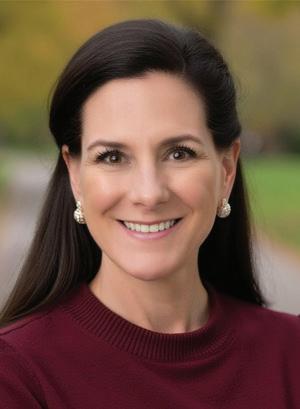
Stephanie Chedid Brings Expertise to MyPath Board
MyPath, a provider of specialized education, therapeutic and community support services for high need individuals, announced that Stephanie Chedid, CEO of Luther Manor, has been named to its Board of Directors.
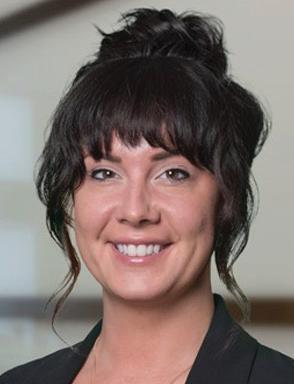
von Briesen is pleased to have Sarah Lundgren join its Milwaukee office

Citizens Bank welcomes Tom Begotka to the team
Tom Begotka, CPA joins Citizens Bank, Mukwonago as a Mortgage Loan Originator. Tom is bringing eight years of mortgage industry experience to the Citizens Bank team and is ready to guide buyers through the home buying or home building process.
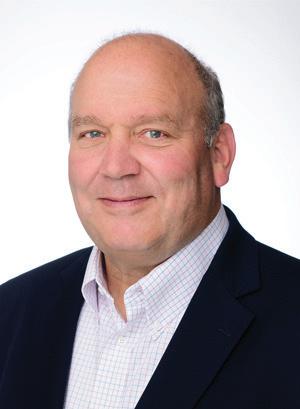
Waukesha State Bank Welcomes Kevin Flood to Commercial Banking Team
Waukesha State Bank is pleased to welcome Kevin Flood as Vice President - Commercial Banking Officer. Kevin will focus on growing and managing commercial loans, helping businesses across southeastern Wisconsin achieve their financial goals.

Stevens Construction Corp. congratulates Jen Flitz on her 20th anniversary!
Stevens Construction Corp. congratulates Jen Flitz on her 20th anniversary with the company. Jen Flitz serves as the Risk Management Specialist, supporting companywide operations across all regions.
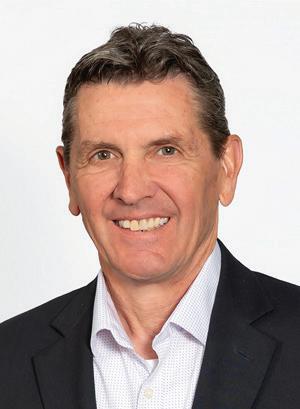
Citizens Bank welcomes Chris Probst to the team
Chris Probst has joined Citizens Bank, Mukwonago as a Mortgage Loan Originator. With over 30 years of mortgage lending experience, Chris is confident in guiding first-time home buyers through the home buying or home building process.
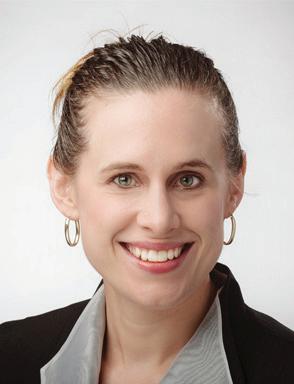
Waukesha State Bank Wealth Management Promotes Theresa Schultz
Waukesha State Bank is pleased to announce the promotion of Theresa Schultz to Vice President –Investment Services Administrator within its Wealth Management division. In her role, she will oversee the management of the bank’s IRA relationships.
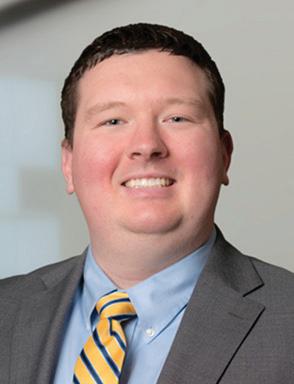
Erik M. Gustafson has been promoted to Shareholder at von Briesen & Roper, s.c.
As a member of the Litigation and Risk Management Section, he focuses his practice on first- and thirdparty insurance coverage analysis, counseling on bad faith claims, and appellate advocacy.
Logan focuses his environmental practice on real estate and business transactions, environmental permitting, compliance counseling and enforcement defense. He is a member of the State Bars of Wisconsin and New Mexico and the Milwaukee Bar Association. LEGAL
As a member of the Litigation & Risk Management Section, she focuses her practice on mass tort/toxic tort matters. Sarah is a member of the State Bar of Wisconsin and the Milwaukee Bar Association.

von Briesen Welcomes
Shareholder Ryan Simatic to its Eau Claire office
As a member of the Real Estate Section, Ryan focuses his practice on eminent domain. He has handled jury trials and evidentiary hearings with property damages ranging from $50,000 to $50 million.
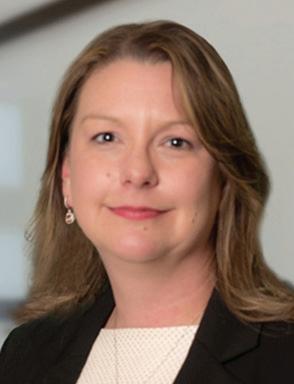
von Briesen Welcomes
Shareholder Ericka Hammett to its Milwaukee office
Ericka joins the Insurance Coverage and Risk Management Section focusing her practice on insurance coverage matters, including advising insurers on first-party property, third-party commercial general liability (CGL), professional liability and bad faith claims.
























NORTHWESTERN MUTUAL PLEDGES
$4.5 MILLION TO MILWAUKEE SCHOOLS AND NONPROFITS
Northwestern Mutual, through the Northwestern Mutual Foundation, has pledged to give $4.5 million across 70 Milwaukee schools and nonprofits this year.
As part of the $4.5 million investment, the Northwestern Mutual Foundation is supporting 220 teachers across 17 area schools through its Summer Teacher Grant program this year. In total, more than 60 summer projects will receive funding –more than double the number of projects supported last year. The grants are intended to help ensure student success during the school year.
Northwestern Mutual is also funding scholarships, university grants and other services to support students in college.
“Education lays the
groundwork for a strong community and a strong workforce,” said Steve Radke, president of the Northwestern Mutual Foundation. “We are thrilled to partner with exceptional educators, ensuring our schools can provide students opportunities to further develop their talents so our city can thrive for generations to come.”
Hmong American Peace Academy, a charter school in Milwaukee, will receive funding for four summer projects, which will focus on “planning groups for the use of AI in classrooms, expanding their teacher pipeline and supporting students pursuing dual enrollment in both high school and college courses,” according to a news release.
— Samantha Dietel, staff writer
Nativity Jesuit Academy will host its 24th annual golf outing on Monday, July 28, at Westmoor Country Club, 400 S. Moorland Road, Brookfield.
The Sharon Lynne Wilson Center for the Arts Golf Classic will be held on Monday, Aug. 11, from 10:30 a.m. to 7 p.m., at The Legend at Merrill Hills, W270 S3425 Merrill Hills Road, Waukesha.
Disability:IN Wisconsin and Rockwell Automation will host a golf outing on Thursday, Sept. 11, from 9:30 a.m. to 6 p.m., at Ironwood Golf Course, W270 N6166 Moraine Drive, Sussex.
Sojourner Family Peace Center will host its “Be the Light” gala on Friday, Sept. 12, at 5:30 p.m. at the Baird Center, 500 W. Kilbourn Ave., Milwaukee.
Gott Pet Products donated cases of dog food and treats valued at over $56,000 to the Wisconsin Humane Society. The donation included 200 cases of Charlee Bear treats and 528 cases of Hound & Gatos canned dog food. | The Wisconsin Humane Society also received a $70,000 grant from Petco Love. | La Causa Inc. received a $5,000 grant from the Catholic Community Foundation to support its Crisis Nursery & Respite Center. | Generac Power Systems raised $50,000 for ToolBank Disaster Services through the “Power Up With Purpose” initiative at Summerfest. | Serving Older Adults received a $20,000 Spectrum Digital Education grant for its Tech Connect program.

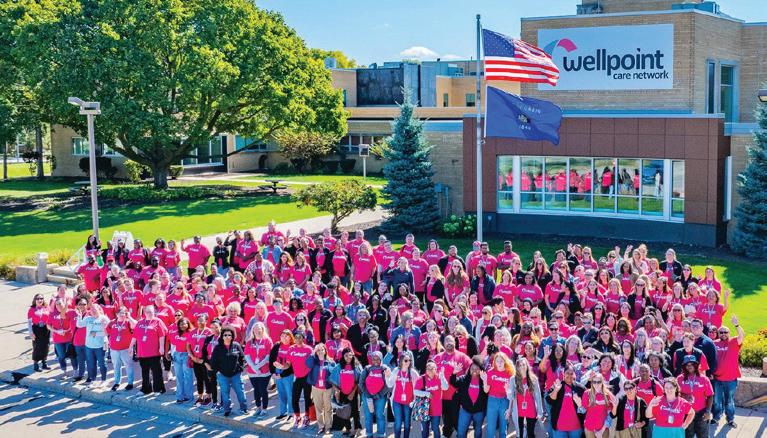
8901 W. Capitol Drive, Milwaukee, WI 53222 414-463-1880 | wellpointcare.org
Facebook: facebook.com/WellpointCare
LinkedIn: linkedin.com/company/wellpointcare
Instagram: @wellpointcare | X: @WellpointCare
Year founded: 1850
Mission statement: To facilitate equity, learning, healing and wellness by restoring the connections that help children and families thrive.
Primary focus: Wellpoint Care Network walks alongside children and families on their journey from adversity to wellness, offering trauma-informed care that is personalized, culturally responsive and rooted in community.

Trust, Oprah Winfrey Charitable Foundation, American Family Insurance Dreams Foundation, Tellier Foundation, Elmbrook Rotary Foundation, Women and Girls Fund of Waukesha County
Executive leadership: Reggie Newson, president and CEO; Kristi Scharl, chief financial and operations officer; Ted Uczen, chief strategy and innovation officer; Sonja Williams, chief human resources officer; Nancy Reed, chief program officer

Other focuses: We provide mental health services to over 1,600 individuals, foster care and case management for nearly 5,900 children and family members annually and comprehensive youth services for 300-plus individuals to ensure their safety, permanence and well-being into adulthood. Our 55 mental health locations across Wisconsin, many embedded in schools, ensure that trauma-informed, culturally responsive care is accessible to families facing adversity. We have also trained more than 78,000 professionals nationwide in our trauma-informed care concepts.
Number of employees: 334 (full and part time)
Is the organization actively seeking board members for the upcoming term? Yes
What roles is it looking to fill? We are currently seeking board members with expertise in fundraising and education.
Ways the business community can help: Sponsorship opportunities are now available for Wellpoint’s 175th anniversary event series in 2025-2026. Additional opportunities include sponsorship of other signature events, organization of corporate volunteer days or drives, providing paid internships or employment pathways for Youth Transitioning to Adulthood participants, and financial support for our general operations.


Key donors: Melitta S. and Joan M. Pick Charitable Trust, Greater Milwaukee Foundation, Otto Bremer


Since our founding in Milwaukee in 1919, Baird has guided local business leaders through changing market cycles and challenging economic environments to achieve their financial objectives. We’ve also invested in initiatives here in the city, the state and the region to help position Wisconsin as a center for business growth and innovation. Because we know from a century of experience that what’s good for local business creates opportunities for us all.
Discover our commitment to innovation
PRIVATE WEALTH MANAGEMENT
ASSET MANAGEMENT
INVESTMENT BANKING/CAPITAL MARKETS
PRIVATE EQUITY

VOLUME 31, NUMBER 5 JULY 21, 2025
126 N. Jefferson St., Suite 403, Milwaukee, WI 53202-6120
PHONE: 414-277-8181 FAX: 414-277-8191
WEBSITE: www.biztimes.com
CIRCULATION: 414-336-7100 | circulation@biztimes.com




This undated photo shows the oldest known building in downtown Pewaukee. Located along Wisconsin Avenue across from the beach and originally built in 1850, the building was recently renovated by Joseph Grasch Development to be home to The Daily Dose Juice Bar and two luxury one-bedroom apartments. In the late 1800s, the building was actually two structures and served as a pharmacy and barbershop. Starting in the 1920s, it was home to Albert’s Pharmacy for more than 50 years.
— Photo courtesy of Joseph Grasch Development. Submit your company’s historic photos at biztimes.com/glance
IN OUR JUNE 2 ISSUE I wrote about the troublesome trends in Milwaukee city government with some officials opposing plans for a hotel in Deer District, a lack of progress on plans for a massive mixed-use development at the Marcus Performing Arts Center parking structure site and opposition to parts of Mayor Cavalier Johnson’s plans to make development of certain types of housing easier.
Fortunately, the hotel project ultimately was approved by the Common Council. Also, a reworked plan to modernize the city’s zoning code to boost and diversify the city’s housing stock was approved by the Common Council, however, the most ambitious elements of the original plan were removed.
Meanwhile, there’s another troubling development controversy at City Hall.
Two of the many challenges facing Milwaukee are the lack of affordable housing available
and the lack of economic development outside of downtown or adjacent neighborhoods like the Third Ward or East Side.
So, you would think there would be great excitement for a massive development on a 50acre site on the far northwest side of the city, an area that struggled for years.
Milwaukee-based development firm Royal Capital Group, founded by Milwaukee native Kevin Newell, unveiled plans in 2023 for a multi-phased development that would eventually include 1,125 residential units, including apartments, some owner-occupied units and some units for seniors.
A development like this could provide a huge boost for this part of the city with more housing options and more residents in the neighborhood to patronize businesses in that area.
But the project has faced intense opposition in the neighborhood and is opposed by the area’s alderwoman, Larresa Taylor. The opposition is based on fears the development will increase crime in the area and also environmental impact concerns, including opposition to the destruction of numerous large, old trees.
In an attempt to alleviate concerns with the project, known as Cudahy Farms, Newell has scaled it back dramatically to just 212 apart-
ADVERTISING: 414-336-7112 | advertising@biztimes.com
EDITORIAL: 414-336-7120 | andrew.weiland@biztimes.com
REPRINTS: 414-336-7100 | reprints@biztimes.com
PUBLISHER / OWNER
Dan Meyer dan.meyer@biztimes.com
DIRECTOR OF OPERATIONS
Mary Ernst mary.ernst@biztimes.com
COMMUNITY
ENGAGEMENT / OWNER
Kate Meyer kate.meyer@biztimes.com
EDITORIAL
EDITOR
Andrew Weiland andrew.weiland@biztimes.com
MANAGING EDITOR
Arthur Thomas arthur.thomas@biztimes.com
ASSOCIATE EDITOR
Maredithe Meyer maredithe.meyer@biztimes.com
REPORTER
Samantha Dietel samantha.dietel@biztimes.com
REPORTER Ashley Smart ashley.smart@biztimes.com
REPORTER
Sonia Spitz sonia.spitz@biztimes.com
REPORTER Hunter Turpin hunter.turpin@biztimes.com
SALES & MARKETING
DIRECTOR OF SALES
Linda Crawford linda.crawford@biztimes.com
SENIOR ACCOUNT EXECUTIVE
Christie Ubl christie.ubl@biztimes.com
ACCOUNT EXECUTIVE
Robin Briese
robin.briese@biztimes.com
ACCOUNT EXECUTIVE
Paddy Kieckhefer paddy.kieckhefer@biztimes.com
ACCOUNT EXECUTIVE
Christy Peterson christy.peterson@biztimes.com
SALES ADMIN Shannon Whiting shannon.whiting@biztimes.com
ADMINISTRATION
ADMINISTRATIVE COORDINATOR Sue Herzog sue.herzog@biztimes.com
AUDIENCE DEVELOPMENT
ASSOCIATE/CIRCULATION Derik Sneide derik.sneide@biztimes.com
PRODUCTION & DESIGN
SENIOR GRAPHIC DESIGNER Alex Schneider alex.schneider@biztimes.com
Independent & Locally Owned — Founded 1995 —
ments, a reduction of more than 80%, which is really unfortunate.
Despite the changes, the opposition remains. Regarding fears that the project will lead to increased crime in the area, Taylor pointed to the troubled Woodlands condominium development nearby and problems with a Royal Capital property in Madison. Newell blamed those issues on a property management firm that has been replaced.
Of course, Royal Capital must be held accountable for ensuring that this development is well managed. But the firm has a good track record and the city needs this development, and many more like it.
Development doesn’t cause crime, people do. The city has a lot of issues with crime and needs to address those. But opposing the Cudahy Farms development isn’t going to help. ■

ANDREW WEILAND EDITOR
/ 414-336-7120 / andrew.weiland@biztimes.com / @AndrewWeiland







President and CEO
Catholic Charities of the Archdiocese of Milwaukee
FOLLOWING THREE DECADES in business and law firm leadership, Paul Eberle has embarked on a new path as head of social services agency Catholic Charities. Eberle retired from Husch Blackwell in 2024, capping off a 13-year stint as chief executive, including seven years at the Kansas Citybased law firm and the previous six years with Milwaukee-based Whyte Hirschboeck Dudek, which merged with Husch in 2016. Appointed in June by Milwaukee Archbishop Jeffrey Grob, Eberle takes the helm as Catholic Charities navigates an ongoing lawsuit against its former finance director for alleged fraud. With programs ranging from adoption and parenting services to immigration support, the organization has a team of more than 70 employees and “dozens” of volunteers across 12 locations in southeastern Wisconsin. In a recent interview with BizTimes associate editor Maredithe Meyer, Eberle discussed his new role and plans for the organization. The following portions of their conversation have been edited for length. Read the full Q&A at biztimes.com/qa-paul-eberle
PRIORITIES FOR THE ORGANIZATION
“My first priority is to listen and learn, right? This organization has been serving the needs of our archdiocese for over 100 years, so I’m coming in and I need to listen to the great team that’s in place and hear from them about what’s working and maybe where some opportunities are. I need to listen to the people that we serve, and are we really delivering for them what they need and are we delivering what the gospel calls us to deliver?
And then also listen to donors – are we fulfilling what they hope to see happen with their precious stewardship of the organization? And also, firstly probably, listen to the archbishop. What is his vision and goal and what does he want Catholic Charities to be doing here as he starts into his role as our archbishop?”
“Any time there’s fraud it’s obviously an unfortunate breakdown of trust with employees, and no different for us, that’s certainly what happened. And I wasn’t here (at the time the alleged fraud was discovered), so I can’t speak to all the details other than law enforcement is handling what they need to handle when this kind of thing happens. The archbishop’s and my goal going forward is to make sure that we put in place – and I think Catholic Charities has already put in place – the necessary steps and guidance and procedures and policies to make sure that that doesn’t happen again. Unfortunately, people make bad decisions, and I think the good news for us is we’ve gotten a lot of support from our donors and the good work that we do serving the poor needs to continue.”
“I think lots of business leaders have good hearts and donate to lots of different charitable organizations, and certainly we would want Catholic Charities to be on the radar of that. And I think also, maybe more importantly, is the work that Catholic Charities does is good for Milwaukee. When you’re a business leader you want a vibrant, healthy, successful market, and the work we do helping people who are living in poverty improve their lives and help themselves is good for business as well. I think telling that story absolutely would be important to building our donor base going forward. … We’ll have lots of opportunities for people to help, and financial support is obviously important but also building a really vibrant, committed volunteer group that can help deliver those services.”